What’s on?
Salon calendar & booking
Go to Booking Now! for a one-stop shop with links to studies available to book now.
Please find below a list of Salon studies already running (or completed earlier this month) and those coming soon. Click any listing for more information, including online booking details and cost where places are still available to book. Unless otherwise indicated, all studies are virtual and conducted online on Zoom (which is free to use for participants). You can also view our Study Calendar with dates of all sessions month-by-month.
We post Salon studies throughout the year, typically eight weeks before the start date. For updates on what’s coming up please subscribe to our free newsletter and check this site regularly. On our Archive page you can browse a list of past Salons and you are welcome to contact us to suggest new studies you would be interested to see or past studies you would like us to offer again.
Please see our Terms & Conditions here.
May 2025
Event Details
Penelope with the Suitors, Pintoricchio, National Gallery (London) We are delighted to announce
Event Details

We are delighted to announce that, as part of our week-long exploration of Homer’s Odyssey on the Greek island of Agistri, Alison Cable has devised a unique experience combining the arts of creative writing and hand-weaving to illustrate Penelope’s story.
Alison explains:
“Take a thread, spin a story. In this playful workshop, we’ll look to Penelope as our muse—unravelling and reweaving words through creative writing and simple hand-weaving. No experience needed, just curiosity and a love of stories and motifs.”
JOINING DETAILS:
- One-off event led by Alison Cable on the Greek island of Agistri.
- This event is provided free-of-charge as part of the Odyssey study (28 April-5 May) and is not available to be booked separately.
- Email us for more information about the Odyssey experience (two places are still available).
- Share details of this event here.
Organizer
Time
28 April 2025 5:00 pm - 5 May 2025 12:00 pm(GMT+01:00)
Event Details
SPECIAL OFFER: Unexpected cancellations for personal reasons mean that we are now able to offer
Event Details
SPECIAL OFFER: Unexpected cancellations for personal reasons mean that we are now able to offer places at £500 each (rather than £700) for anyone booking two or more places! Email us for more information.
In 2025 we will return for our fifth visit to the enchanting island of Agistri on the Saronic Gulf. This year we will study Homer’s Odyssey and Euripides’ Trojan Women in a location that evokes the landscape and environment in which these extraordinary and enduring works were written. Join us if you can!
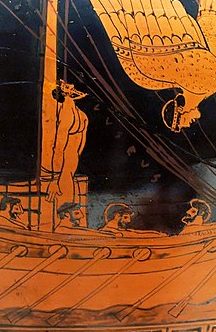
“Tell me about a complicated man.
Muse, tell me how he wandered and was lost
when he had wrecked the holy town of Troy.
and where he went, and who he met, the pain
he suffered on the storms at sea, and how
he worked to save his life and bring his men
back home.”The opening lines of Emily Wilson’s translation of Homer’s Odyssey
In 2019 the London Literary Salon travelled to Agistri to read The Odyssey and in 2024 we completed the Homeric cycle by reading The Iliad on the island, using Emily Wilson’s powerful contemporary translations for both studies. In 2025 we will return to Agistri to revisit The Odyssey in all its vivid and gripping glory.
Our Odyssey study will use Homer’s epic poem to consider closely the guest-host relationship, the defining struggle of humans against overwhelming nature, the struggle to know ourselves in foreign spaces, our understanding of the heroic and the role of myth and epic in lived experience.
Actor Jane Wymark and poet Caroline Hammond will join Salon Director Toby Brothers in leading this week-long study, sharing their insights into the spoken word, metre and translation and how to read out loud to greater effect. In an era where the epic poem is in eclipse (the novel and film having taken over as the preferred vehicles for complex narratives) we will explore aspects of the Odyssey as a work in the oral tradition.
Our chosen venue is a small family-run hotel that is easily accessible (just one hour by ferry from Athens) on the beautiful and quiet island of Agistri. It provides the perfect setting for our study, offering a relaxing atmosphere, excellent food and opportunities for additional cultural and recreational activities.
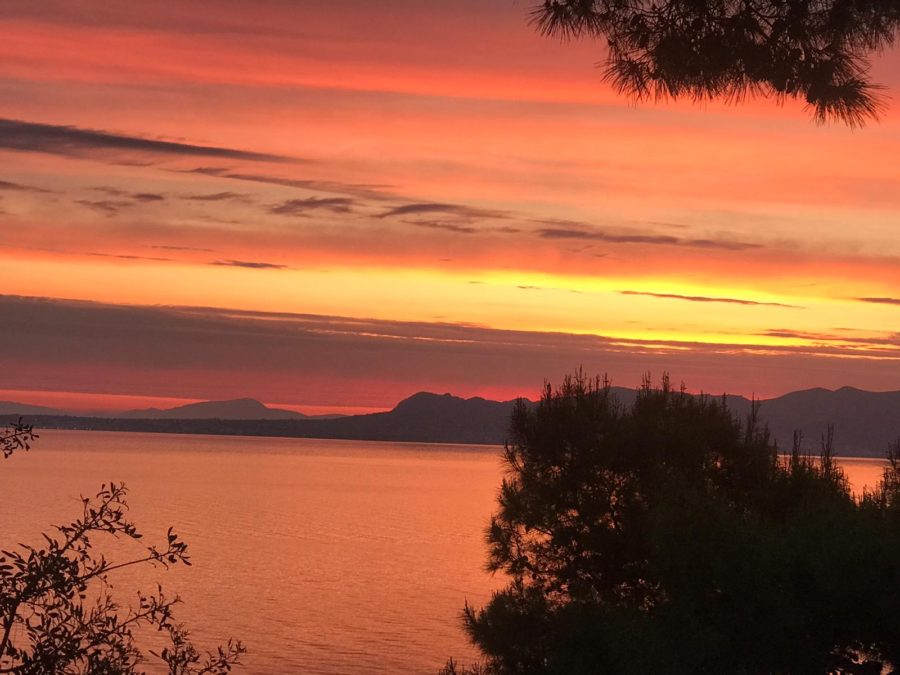
STUDY DETAILS:
- Share details of this study using this link
- Seven-day study of Homer’s Odyssey on the island of Agistri: 28 April – 5 May 2025.
- Facilitated by Toby Brothers, Jane Wymark and Caroline Hammond.
- Cost: £700 for the Salon study, to include preparatory meeting in April (via Zoom, date to be confirmed), background materials and opening notes. Opening notes will be sent after registration.
- The study programme will run for four to five hours per day for five days, with one day left open and travel at each end. There will be time for other optional activities including kayaking adventures, a trip to the Temple of Aphaia on Aegina, or pure relaxation.
- Before you arrive on Agistri we will ask you to read Emily Wilson’s translation of The Odyssey (WW Norton & Co, ISBN-10: 0393356256; ISBN-13: 978-0393356250). Ian McKellen’s audio reading of Robert Fagles’ translation is also a great way to experience The Odyssey.
- Payment: we understand that you may not want to pay the entire charge at once, so we ask for an initial (non-returnable) deposit of £20 on registration followed by £180 within 28 days and the balance of £500 by 31 January 2025.
- Refunds: please note that any refunds will be entirely at the discretion of the London Literary Salon, dependent on our ability to fill the place, and will be subject to a charge to cover our administration costs.
BOOKING
To ask questions please email us at litsalon@gmail.com using ‘Agistri 2025 – Odyssey’ as the subject line. Payment will be by bank transfer (N.B. we will supply bank details). If the study sells out early we will maintain a waiting list as we do sometimes find that people have to withdraw for reasons beyond their control.
ADDITIONAL COSTS
Room and half board (breakfast and dinner each day) will be arranged by each participant with the hotel and paid for directly to them. A deposit to cover two nights accommodation will be required by the hotel. We will send you full contact details for payment on registration. We have set out the anticipated charges below, but these may be subject to change at the time of booking at the discretion of the hotel.
Accommodation prices per night at the hotel – Rosy’s Little Village – estimated on the basis of figures available in October 2024:
- Single – €77 per night plus half board (breakfast and dinner) estimated at €55 per day
- Double – €87 per night plus half board (breakfast and dinner) estimated at €55 per person per day
- Triple – €77 per night plus half board (breakfast and dinner) estimated at €55 per person per day
- Family room for two people – €97 per night plus half board (breakfast and dinner) estimated at €55 per person per day
- Family room for three people – €107 per night plus half board (breakfast and dinner) estimated at €55 per person per day
Please consider sharing accommodation with another participant as this helps us to ensure everyone can stay on site; double and triple rooms offer split levels and so allow sharers a significant degree of privacy.
Flights to Athens: when booking please make sure you can arrive in Piraeus by 15.00 local time on the first day of your study to catch the ferry. We will not be meeting formally on the final day of each study, so you have choices about your return (ferries are frequent and the travel time to Piraeus is one hour).
Ferry to Agistri: normally around €14 each way, but may be €30 for arrival if the group chooses to use a private water taxi.
Incidental expenses: drinks, lunches, extra trips etc.
Insurance: we hope this will be entirely redundant, but we do ask you to arrange your own travel and health insurance to protect you in case of anything untoward happening. We will ask you for details of the insurance provider and reference number, as well as your mobile phone number and details of next of kin to add to our (confidential) records for use during the study.
Time
28 April 2025 5:00 pm - 5 May 2025 12:00 pm(GMT+01:00)
Location
Agistri, Greece
Event Details
In 2025 we will return for our fifth visit to the enchanting island of Agistri on the
Event Details
In 2025 we will return for our fifth visit to the enchanting island of Agistri on the Saronic Gulf. This year we will study Homer’s Odyssey and Euripides’ Trojan Women in a location that evokes the landscape and environment in which these extraordinary and enduring works were written. Join us if you can!
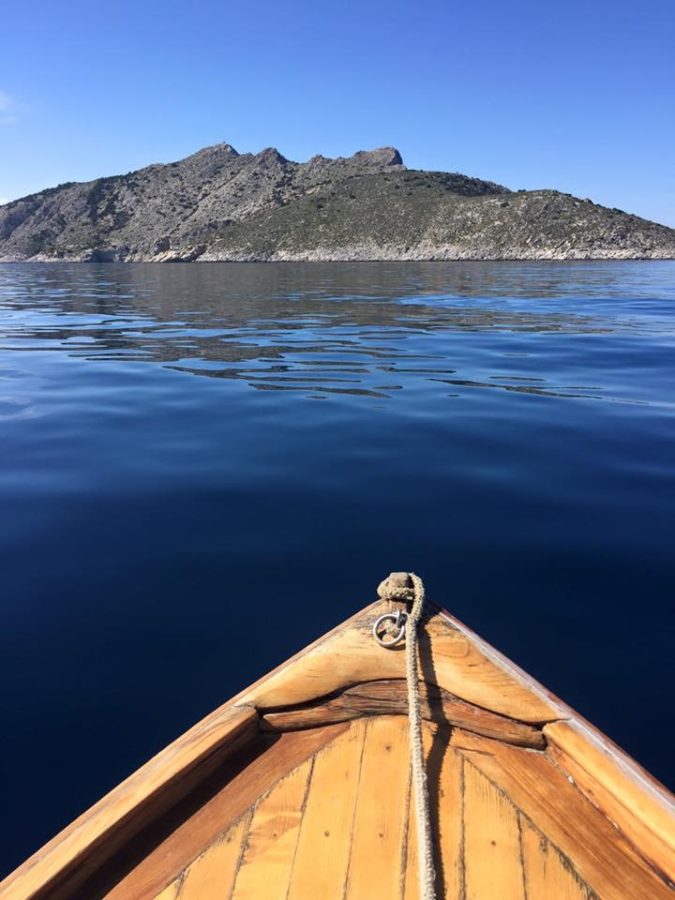
“The strong do what they can, the weak suffer what they must.”
Thucydides’ Melian Dialogue
When, in 458 BC, The Oresteia of Aeschylus – a trilogy in which the climax of the third play, The Eumenides, upheld the Athenian traditions of liberality and the rule of law – triumphed at the Dionysia, it must have been exhilarating for the audience to witness the exaltation of their own city. Much had changed just forty-three years later when Euripides’ Trojan Women was performed and won the second prize in the contest.
For the last ten of those years Athens had waged the hugely destructive Peloponnesian War against Sparta and several Greek cities had suffered a fate not unlike that of Troy. Although a truce with Sparta was just about holding, the Athenians were still trying to expand their martial capability through colonisation. In the summer of 416 BC, less than a year before Euripides’ play appeared, Athens laid siege to the small but wealthy island of Melos in the South Aegean (which had already donated much to the war effort but drew the line at being occupied and exploited) and, once the Melians were defeated, massacred its male population and enslaved the women and children.
The audience at the theatre of Dionysus in Athens would have included veterans of the Melian campaign, and it speaks for the Greek respect for theatre and artistic freedom that performance of the play was permitted at all. That openness is not always matched by our own society today: In 1980 A Short Sharp Shock! a play by Howard Brenton and Tony Howard satirising British politics of the time led to outrage, questions in the House of Commons and an attempt to close down the Royal Court Theatre. Four years after the UK’s 1982 Falklands War, a verse play by Steven Berkoff, Sink the Belgrano!, caused a similarly huge controversy.
During our 2023 visit to Agistri we considered the theatrical representation of the Trojan War and its aftermath in The Oresteia. In 2025 we will embark on the study of Trojan Women with Salon Director Toby Brothers, actor Jane Wymark and poet Caroline Donnelly bringing their considerable talents and energy to exploring the dramatic possibilities of the text and the poetry contained within this phenomenal work.
Our chosen venue is a small family-run hotel that is easily accessible (just one hour by ferry from Athens) on the beautiful and quiet island of Agistri. It provides the perfect setting for our study, offering a relaxing atmosphere, excellent food and opportunities for additional cultural and recreational activities.

STUDY DETAILS:
- Seven-day study of Euripides’ Trojan Women on the island of Agistri: 7 – 14 May 2025.
- Facilitated by Toby Brothers, Jane Wymark and Caroline Hammond.
- Cost: £700 for the Salon study, to include preparatory meeting in April (via Zoom, date to be confirmed), background materials and opening notes. Opening notes will be sent after registration.
- The study programme will run for four to five hours per day for five days, with one day left open and travel at each end. There will be time for other optional activities including kayaking adventures, a trip to the Temple of Aphaia on Aegina, or pure relaxation.
- We will ask you to read the recommended translation of Trojan Women by Emily Wilson contained in this volume: Greek Plays: Sixteen Plays by Aeschylus, Sophocles, and Euripides (Modern Library Classics – Paperback, ISBN 978-0812983098) before arriving on Agistri.
- Payment: we understand that you may not want to pay the entire charge at once, so we ask for an initial (non-returnable) deposit of £20 on registration followed by £180 within 28 days and the balance of £500 by 31 January 2025.
- Refunds: please note that any refunds will be entirely at the discretion of the London Literary Salon, dependent on our ability to fill the place, and will be subject to a charge to cover our administration costs.
BOOKING
To ask questions please email us at litsalon@gmail.com using ‘Agistri 2025 – Trojan Women’ as the subject line. Payment will be by bank transfer (N.B. we will supply bank details). If the study sells out early we will maintain a waiting list as we do sometimes find that people have to withdraw for reasons beyond their control.
ADDITIONAL COSTS
Room and half board (breakfast and dinner each day) will be arranged by each participant with the hotel and paid for directly to them. A deposit to cover two nights accommodation will be required by the hotel. We will send you full contact details for payment on registration. We have set out the anticipated charges below, but these may be subject to change at the time of booking at the discretion of the hotel.
Accommodation prices per night at the hotel – Rosy’s Little Village – estimated on the basis of figures available in October 2024:
- Single – €77 per night plus half board (breakfast and dinner) estimated at €50 per day
- Double – €87 per night plus half board (breakfast and dinner) estimated at €55 per person per day
- Triple – €77 per night plus half board (breakfast and dinner) estimated at €55 per person per day
- Family room for two people – €97 per night plus half board (breakfast and dinner) estimated at €55 per person per day
- Family room for three people – €107 per night plus half board (breakfast and dinner) estimated at €55 per person per day
- Family room for four people – €120 per night plus half board (breakfast and dinner) estimated at €55 per person per day
Please consider sharing accommodation with another participant as this helps us to ensure everyone can stay on site; double and triple rooms offer split levels and so allow a significant degree of privacy to sharers.
Flights to Athens: when booking please make sure you can arrive in Piraeus by 15.00 local time on the first day of your study to catch the ferry. We will not be meeting formally on the final day of each study, so you will have choices about your return (ferries are frequent and the travel time to Piraeus is one hour).
Ferry to Agistri: normally around €14 each way, but may be €30 for arrival if the group chooses to use a private water taxi.
Incidental expenses: drinks, lunches, extra trips etc.
Insurance: we hope this will be entirely redundant, but we do ask you to arrange your own travel and health insurance to protect you in case of anything untoward happening. We will ask you for details of the insurance provider and reference number, as well as your mobile phone number and details of next of kin to add to our (confidential) records for use during the study.
Time
7 May 2025 5:00 pm - 14 May 2025 12:00 pm(GMT+01:00)
Location
Agistri, Greece
Event Details
Photo by Annie Spratt on Unsplash ‘We
Event Details
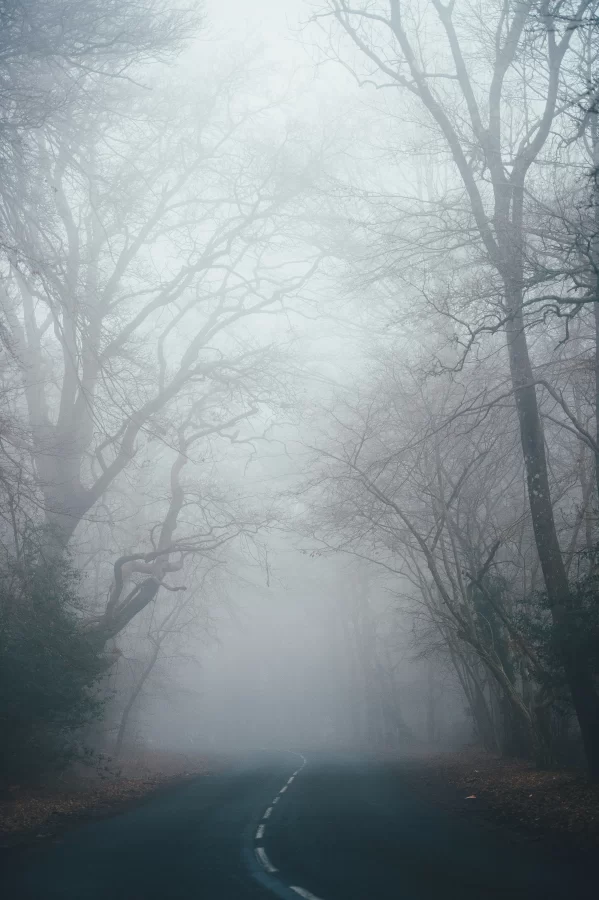
‘We live over in the town, six miles away.’
‘Yes,’ Eleanor said, remembering Hillsdale.
‘So, there won’t be anyone around if you need help.’
‘I understand.’
‘We couldn’t even hear you, in the night.’
‘I don’t suppose-’
‘No one could. No one lives any nearer than town. No one else will come any nearer than that.’
‘I know,’ Eleanor said tiredly.
‘In the night,’ Mrs Dudley said, and smiled outright.
For Eleanor Vance, frustrated and bored with her city life, Hill House holds the promise of change. She embraces the opportunity to embark on Dr Montague’s oddly vague scientific project located in an isolated countryside house. His experiment promises a new start and a chance to put behind her memories of nursing an invalid mother. Eleanor is delighted to make friends with the round, rosy and bearded Dr Montague, and her fellow invitees, the sophisticated and cat-like Theo, and facetious heir to the estate, Luke. And yet, Eleaner soon realises that it is the house itself, which is central to their encounters, a building which broods and presses them down with the quiet weight of its own history.
Shirley Jackson’s Hill House, with its quirky, off-kilter architecture and uneasy relationships shows plenty of potential to unbalance the unwary. Acclaimed by Stephen King as a ‘nearly perfect haunted-house tale,’ and adapted for film in 1963 and 1999, Shirley Jackson’s gothic tale continues to be a classic text that is both entertaining and intriguing. In an era dominated by atheism, secularism and science, why is it that we are still drawn to the uncanny and the ghostly? What is it about gothic mansions filled with dark recesses that draws us in and fascinates us with their ghostly reminders of wronged lives? Could it be that, for all our modern sophistication, none of us fully shake our dread of unquiet places where we fear to tread alone?
Over four sessions (covering approximately 60 pages per session) we will follow the events at Hill House to their dramatic conclusion and consider wider aspects of gothic literature. Will you linger on the threshold wondering whether to go back? Or might you join the salon to find out what happens in Hill House after dark, when no one will come near?
JOINING DETAILS:
- Four meeting study on Zoom led by Nicky von Fraunhofer
- Wednesday 30 April to 21 May, 5.30 – 7.30 pm (UK)
- £140 to include opening notes and resources
- Recommended text The Haunting of Hill House, Penguin Modern Classics: ISBN 978-0141191447
Organizer
Time
7 May 2025 5:30 pm - 7:30 pm(GMT+01:00)
Location
VIRTUAL - ON ZOOM
Event Details
Photograph of monument to Fernando Pessoa in front of cafe “A Brasileira” in Lisbon by Nol Aders, via Wikimedia
Event Details
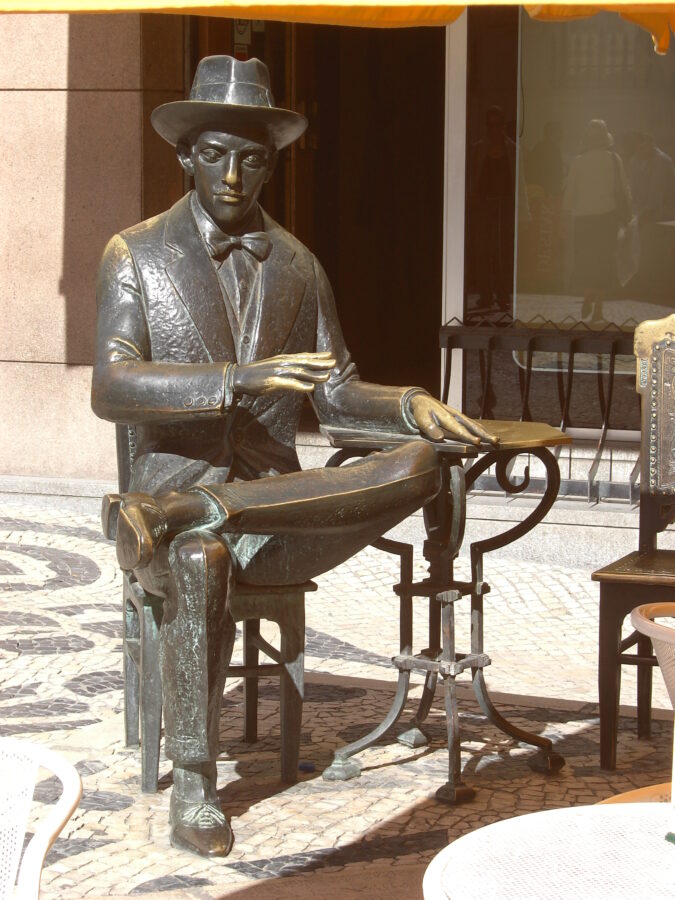
Fernando Pessoa (1888-1935) was, quipped one critic, Portugal’s three greatest modern poets. To read Pessoa is not just to read one poet but to enter into a whole literature.
Pessoa’s attempt to forge a new literary modernism for Portugal took shape through his creation of different literary personas. He called these personas ‘heteronyms’, to distinguish them from pseudonyms, as essentially distinct personalities with biographies, literary styles and philosophical and political ideas as different from each other as from Pessoa himself.
Pessoa authored works under at least 72 different names throughout his life, and this compulsion seems to have been both an aesthetic and a psychological necessity. At the centre of his most important and accomplished literary achievements is the poetry authored by the three main heteronyms – Alberto Caiero, Alvaro de Campos and Ricardo Reis; by Pessoa himself as one of that company of heteronyms; and his great prose masterpiece The Book of Disquiet, authored by the semi-heteronym Bernardo Soares.
Over five meetings we will take a sample of work from each of Pessoa’s heteronyms as a general introduction to the work – and the literary universe – of Fernando Pessoa.
JOINING DETAILS:
- Six-week introductory study led by Desma Lawrence
- Tuesdays, 12.00-2.00 pm (UK), 13 May to 17 June 2025
- £180 for six-session study, to include opening notes and resources
Organizer
Time
13 May 2025 12:00 pm - 2:00 pm(GMT+01:00)
Location
VIRTUAL - VIA ZOOM
Future Event Times in this Repeating Event Series
Event Details
Olympia by Edouard Manet, Musée d’Orsay, Public domain, via Wikimedia Commons
Event Details
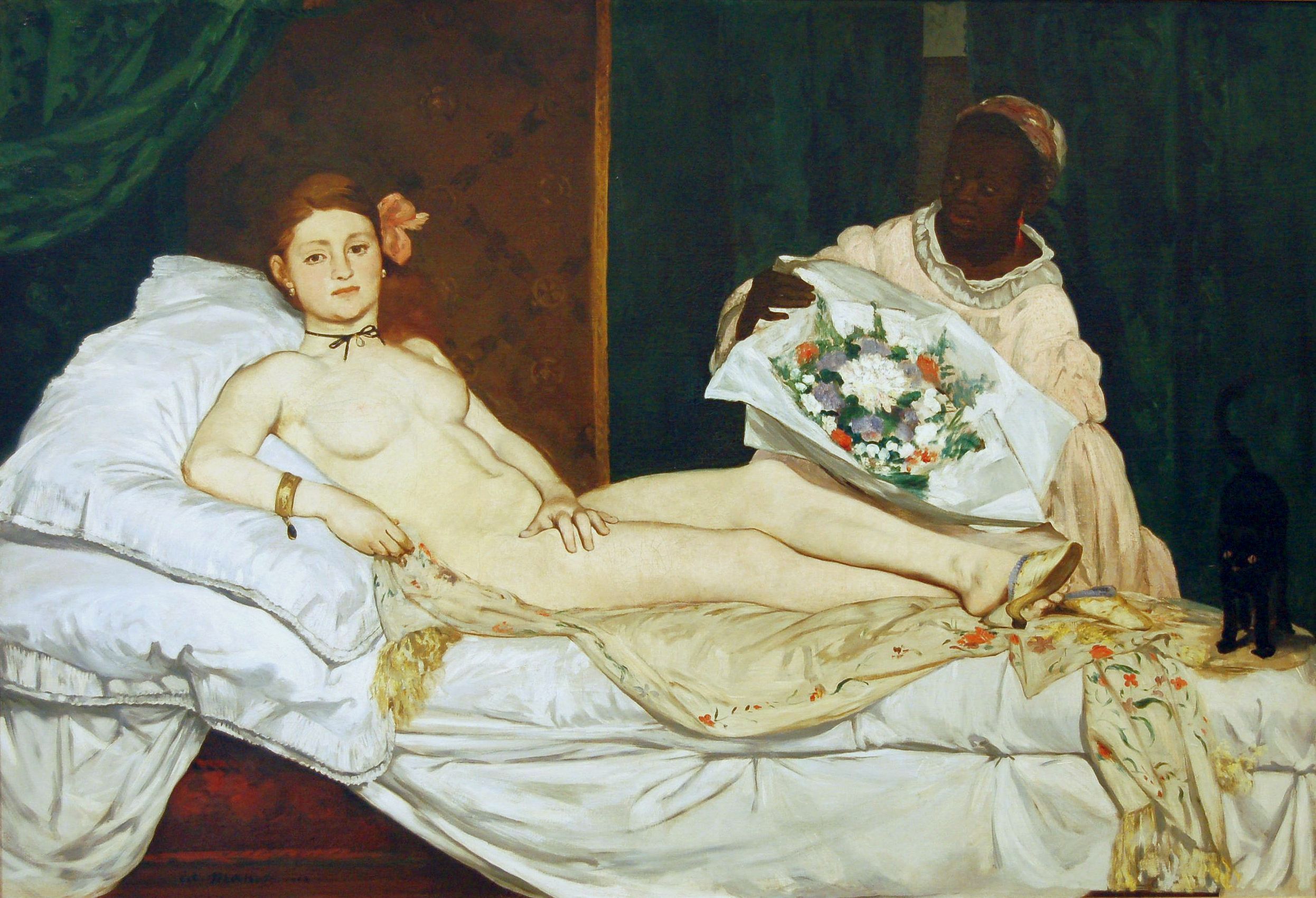
In 2025, ahead of our five-day travel study in Paris this autumn, we continue Sean Forester’s Looking at Pictures Salon with two new studies focusing on 19th century art in France. Walking through the halls of the Louvre and the Musée d’Orsay we see masterpieces by David and Ingres, Gericault and Delacroix, Courbet and Manet, Monet and Degas. What a fascinating range of styles and techniques! With the political and social tumult that characterised 19th century France, art movements followed fast upon one another: Neoclassicism, Romanticism, Realism and Impressionism. Participants will explore all of this together, discussing both the formal qualities and the emotions and ideas to be found in these remarkable works of art.
Part II: Art in France 1870-1900
The Judgment of Paris: The Revolutionary Decade that Gave the World Impressionism by Ross King gives a vivid picture of the Belle Epoque and the personalities of two very different artists: Ernest Meissonier and Edouard Manet. The topics of our meetings will be as follows:
1. Historical painting, Meissonier
2. Realism and Naturalism
3. Monet and Impressionism
4. Manet, Degas
5. Rodin and late 19th century sculpture
6. Women artists in Paris
JOINING DETAILS:
- Six-week study on Zoom led by Sean Forester
- Thursdays, 4.00-6.00 pm (UK)
- 15, 22, 29 May, 12,19, 26 June 2025 (N.B. no meeting on 5 June)
- Reference text: The Judgment of Paris: The Revolutionary Decade that Gave the World Impressionism by Ross King, ISBN-13: 978-1844134076
- £180 for six meetings
Organizer
Time
15 May 2025 4:00 pm - 6:00 pm(GMT+01:00)
Location
VIRTUAL - VIA ZOOM
Future Event Times in this Repeating Event Series
Event Details
“You should approach Joyce’s Ulysses as the illiterate Baptist preacher approaches the Old Testament:
Event Details
“You should approach Joyce’s Ulysses as the illiterate Baptist preacher approaches the Old Testament:
with faith.”
—William Faulkner

First published on 2 February 1922 – James Joyce’s 40th birthday – UIysses was immediately controversial, described by one Irish critic as “The most infamously obscene book in ancient or modern literature”.
We offer an opportunity to read one of the greatest novels of all time in the company of others. Our work with this book will widen your perspective and deepen your experience of the power of language.
There is a strong argument for studying this huge and intimidating text – book list chart-topper of 100 greatest books of all time, critics’ darling, most lauded/least read, the book that many literary academics dedicate their lives to studying – but you will only know for yourself by diving in. I believe the best way to study it is with a group of hungry, curious readers who all contribute to evoking meaning, through their questions as well as their insights.
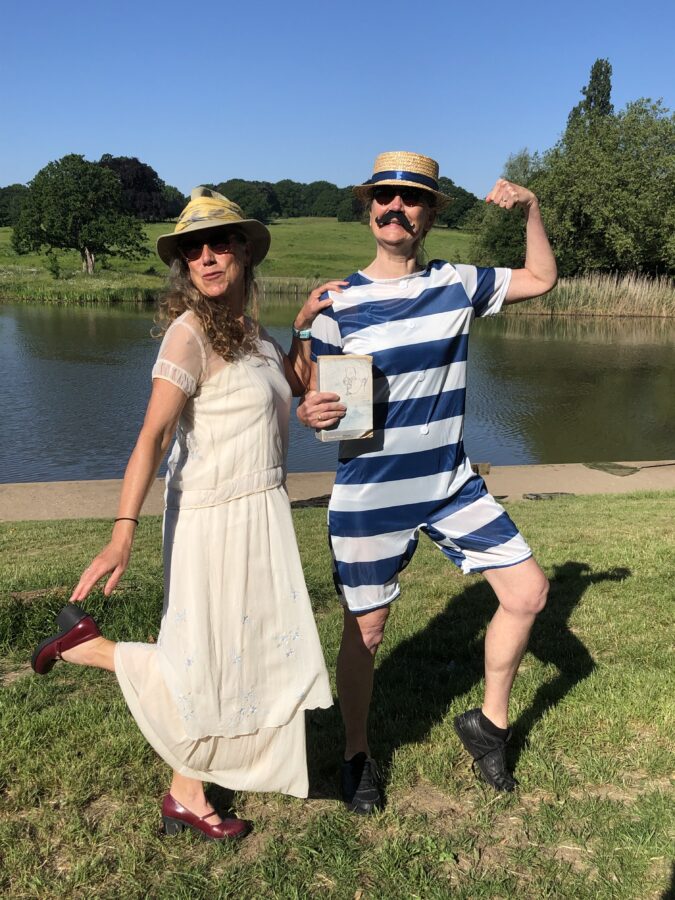
The good news: reading Ulysses is fun. And I don’t mean in a frustrating, overly-analytical see-how-much-you-know-way. The language is amazing – even when I don’t understand it. Perhaps, especially when I don’t understand it, because meaning sneaks in through more than my critical faculty. Meaning slides in through sound, through the lushness of the language, through the filmy and substantial images, and suddenly I find myself transported from a walk on a beach to a contemplation of the origins of man – thanks, James Joyce.
Any time spent studying Joyce leaves one a better reader – a broader thinker – even if all the references, repetitions, epiphanies and allusions are not immediately understood.
Here are comments from two Ulysses participants:
“I am thoroughly enjoying this journey. I feel wide open, exposed and receptive to new ways of thinking. What could be better than that? I enjoy the links with the classics and their current counterparts such as the agony of Sisyphus and the trials of thoughtful, surely sad, Martin Cunningham. And then Bloom with his many pockets reminded me in an amusing way of the Artful Dodger.
“The classes I have taken with the Literary Salon have been extraordinary.“
“Joining the Ulysses salon was one of the best things I have ever done. This was a book I had wanted to read for years but never got past the first section. I had no idea what the salon would be like and was very apprehensive about joining up. But Toby so skilfully guided us through it, her knowledge of the text seemingly inexhaustible, that with her warmth and generosity and sensitivity she got everyone involved and the satisfaction of participating in the salon and in getting an understanding of this marvellous work was immense.“
JOINING DETAILS:
- We are offering this evening study from 5.30-7.30pm (UK time), comprising 21 meetings starting on Tuesday 21 January and finishing on Tuesday 17 June 2025, with four Sunday meetings (4.30-6.30pm on 23 February, 30 March, 18 May and 8 June) and NO meetings on 4 March, 29 April, 6 and 13 May.
- The total cost for the 21 meeting study, with all notes and resources materials, is £500
- Please purchase these editions in preparation for our study:
- Ulysses, by James Joyce, Annotated Students’ Edition, Penguin Modern Classics 2011, ISBN: 9780141197418. There are many editions of Ulysses — I find this edition is most coherent and the notes and introduction by Declan Kieberd very helpful; as we will constantly be referencing particular passages, having the same edition will be extremely useful.
- The New Bloomsday Book: A Guide Through Ulysses, by Harry Blamires, ISBN-10: 0415138582
Organizer
Time
18 May 2025 4:30 pm - 6:30 pm(GMT+01:00)
Location
VIRTUAL - ON ZOOM
Future Event Times in this Repeating Event Series
Event Details
“You should approach Joyce’s Ulysses as the illiterate Baptist preacher approaches the Old Testament:
Event Details
“You should approach Joyce’s Ulysses as the illiterate Baptist preacher approaches the Old Testament:
with faith.”
—William Faulkner

First published on 2 February 1922 – James Joyce’s 40th birthday – UIysses was immediately controversial, described by one Irish critic as “The most infamously obscene book in ancient or modern literature”.
We offer an opportunity to read one of the greatest novels of all time in the company of others. Our work with this book will widen your perspective and deepen your experience of the power of language.
There is a strong argument for studying this huge and intimidating text – book list chart-topper of 100 greatest books of all time, critics’ darling, most lauded/least read, the book that many literary academics dedicate their lives to studying – but you will only know for yourself by diving in. I believe the best way to study it is with a group of hungry, curious readers who all contribute to evoking meaning, through their questions as well as their insights.

The good news: reading Ulysses is fun. And I don’t mean in a frustrating, overly-analytical see-how-much-you-know-way. The language is amazing – even when I don’t understand it. Perhaps, especially when I don’t understand it, because meaning sneaks in through more than my critical faculty. Meaning slides in through sound, through the lushness of the language, through the filmy and substantial images, and suddenly I find myself transported from a walk on a beach to a contemplation of the origins of man – thanks, James Joyce.
Any time spent studying Joyce leaves one a better reader – a broader thinker – even if all the references, repetitions, epiphanies and allusions are not immediately understood.
Here are comments from two Ulysses participants:
“I am thoroughly enjoying this journey. I feel wide open, exposed and receptive to new ways of thinking. What could be better than that? I enjoy the links with the classics and their current counterparts such as the agony of Sisyphus and the trials of thoughtful, surely sad, Martin Cunningham. And then Bloom with his many pockets reminded me in an amusing way of the Artful Dodger.
“The classes I have taken with the Literary Salon have been extraordinary.“
“Joining the Ulysses salon was one of the best things I have ever done. This was a book I had wanted to read for years but never got past the first section. I had no idea what the salon would be like and was very apprehensive about joining up. But Toby so skilfully guided us through it, her knowledge of the text seemingly inexhaustible, that with her warmth and generosity and sensitivity she got everyone involved and the satisfaction of participating in the salon and in getting an understanding of this marvellous work was immense.“
JOINING DETAILS:
- We are offering this study early in the day, from 11.30-1.30pm (UK time), comprising 21 meetings starting on Tuesday 21 January and finishing on Tuesday 17 June 2025, with four Sunday afternoon meetings (4.30-6.30pm on 23 February, 30 March, 18 May and 8 June) and NO meetings on 4 March, 29 April, 6 and 13 May.
- The total cost for the 21 meeting study, with all notes and resources materials, is £500
- Please purchase these editions in preparation for our study:
- Ulysses, by James Joyce, Annotated Students’ Edition, Penguin Modern Classics 2011, ISBN: 9780141197418. There are many editions of Ulysses — I find this edition is most coherent and the notes and introduction by Declan Kieberd very helpful; as we will constantly be referencing particular passages, having the same edition will be extremely useful.
- The New Bloomsday Book: A Guide Through Ulysses, by Harry Blamires, ISBN-10: 0415138582
Organizer
Time
18 May 2025 4:30 pm - 6:30 pm(GMT+01:00)
Location
VIRTUAL - ON ZOOM
Future Event Times in this Repeating Event Series
Event Details
Event Details
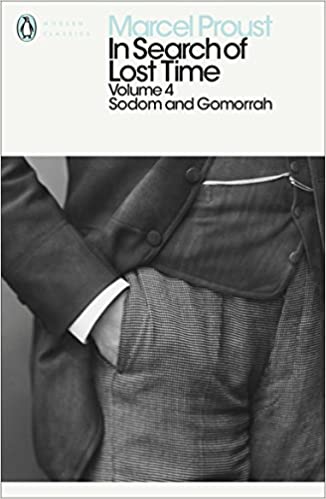
“Every reader finds himself. The writer’s work is merely a kind of optical instrument that makes it possible for the reader to discern what, without this book, he would perhaps never have seen in himself.“
Marcel Proust
After completing incredibly satisfying studies of Ulysses and Magic Mountain, we have turned to the next big mountain of Modernism, Marcel Proust’s In Search of Lost Time. This is my seventh tour through the Search and each visit reveals new nuggets and gasping moments. This fourth volume, Sodom and Gomorrah, considers closely the draw of the social dance and the realm of social power: you might not think the anxious aristocracy of the Belle Epoque will teach you anything about the world you live in, but you will be surprised. The group that has made it through the first three volumes in the last six months is lively and welcoming and we may have room for two or three more participants. If you have not read the first three volumes previously, please contact us to discuss.
Here is how one Salonista describes the pleasure and work of reading Proust: “This is a velvet jewel of a book that demands the attention of a lover full of enchantment and obsession, we need not get impatient as all good lovers perfect their art in taking their time.”
Reading Proust teaches the reader to observe how the world is experienced, to be aware that although humans are tempted to give greater weight to the perceptual universe, it is the entwining of memory, idealised experience (dreams) and relationships, together with what our senses perceive, that moulds our consciousness.
I’d like to share with you part of Edmund White’s essay on this section from Andre Aciman’s collection The Proust Project:
“In these pages, Proust alludes to so many conflicting theories of homosexuality that they end up by casting doubt on one another — and on all such theories. In fact they suggest, finally, that only the conventions of a few cultures (but not all or even most cultures) determine the definition of normality; mere convention and nothing more absolute defines the status of homosexuality.
On the face of it nothing could seem further from the Proustian position. He starts out with the most extreme (and the most offensive) theory; that male homosexuals are inverts, i.e., women disguised as men. this whole initial disquisition on homosexuality is triggered by Marcel’s realization that Charlus’s face in repose is that of a woman since ‘he was one.’ This is the theory of ‘the soul of a woman enclosed in the body of a man’ first worked out by the German sexologist Karl Heinrich Ulrichs in 1868.
Proust plays with the theories and homophobia of his time – and exposes societal hypocrisies in all forms.”
JOINING DETAILS:
- Facilitated by Toby Brothers
- Mondays, 1.00-3.00 pm (UK)
- Thirteen-meeting study on Zoom starting on 27 January 2025 (N.B. no meetings on 3 March, 14 & 28 April, 5 & 12 May)
- Recommended editions: Penguin, ISBN 9780141180342, Christopher Prendergast (Editor), John Sturrock (Translator) OR Vintage Classics, ISBN 9780099362517
- £390 for thirteen meetings (includes background materials, literary criticism, opening notes and discussion notes)
Organizer
Time
19 May 2025 1:00 pm - 3:00 pm(GMT+01:00)
Location
VIRTUAL - ON ZOOM
Event Details
Event Details

“Every reader finds himself. The writer’s work is merely a kind of optical instrument that makes it possible for the reader to discern what, without this book, he would perhaps never have seen in himself.“
Marcel Proust
This ‘second time around’ study is designed specifically for people who, having completed their journey through Proust’s monumental creation at least once, have the urge to do it again.
Facilitator Toby Brothers writes:
Marcel Proust’s In Search of Lost Time is one of the mountains of Modernism. This is my seventh tour through the Search and each visit reveals new nuggets and gasping moments. This fourth volume considers closely the draw of the social dance and the realm of social power: you might not think the anxious aristocracy of the Belle Epoque will teach you something about the world you live in, but you will be surprised.
Here is how one Salonista describes the pleasure and work of reading Proust: “This is a velvet jewel of a book that demands the attention of a lover full of enchantment and obsession, we need not get impatient as all good lovers perfect their art in taking their time.”
Reading Proust teaches the reader to observe how the world is experienced, to be aware that although humans are tempted to give greater weight to the perceptual universe, it is the entwining of memory, idealised experience (dreams) and relationships, together with what our senses perceive, that moulds our consciousness.
I’d like to share with you part of Edmund White’s essay on this section from Andre Aciman’s collection The Proust Project:
“In these pages, Proust alludes to so many conflicting theories of homosexuality that they end up by casting doubt on one another — and on all such theories. In fact they suggest, finally, that only the conventions of a few cultures (but not all or even most cultures) determine the definition of normality; mere convention and nothing more absolute defines the status of homosexuality.
On the face of it nothing could seem further from the Proustian position. He starts out with the most extreme (and the most offensive) theory; that male homosexuals are inverts, i.e., women disguised as men. this whole initial disquisition on homosexuality is triggered by Marcel’s realization that Charlus’s face in repose is that of a woman since ‘he was one.’ This is the theory of ‘the soul of a woman enclosed in the body of a man’ first worked out by the German sexologist Karl Heinrich Ulrichs in 1868.
Proust plays with the theories and homophobia of his time – and exposes societal hypocrisies in all forms.”
JOINING DETAILS:
- Facilitated by Toby Brothers
- Mondays, 3.30-5.30 pm (UK)
- Thirteen-meeting study on Zoom starting on 27 January 2025 (N.B. no meetings on 3 March, 14 & 28 April, 5 & 12 May)
- Recommended editions: Penguin, ISBN 9780141180342, Christopher Prendergast (Editor), John Sturrock (Translator) OR Vintage Classics, ISBN 9780099362517
- £390 for thirteen meetings (includes background materials, literary criticism, opening notes and discussion notes)
Organizer
Time
19 May 2025 3:30 pm - 5:30 pm(GMT+01:00)
Location
VIRTUAL - ON ZOOM
Event Details
Event Details

“Every reader finds himself. The writer’s work is merely a kind of optical instrument that makes it possible for the reader to discern what, without this book, he would perhaps never have seen in himself.“
Marcel Proust
After completing incredibly satisfying studies of Ulysses and Magic Mountain, we have turned to the next big mountain of Modernism, Marcel Proust’s In Search of Lost Time. This is my seventh tour through the Search and each visit reveals new nuggets and gasping moments. This fourth volume, Sodom and Gomorrah, considers closely the draw of the social dance and the realm of social power: you might not think the anxious aristocracy of the Belle Epoque will teach you anything about the world you live in, but you will be surprised. The group that has made it through the first three volumes in the last six months is lively and welcoming and we may have room for two or three more participants. If you have not read the first three volumes previously, please contact us to discuss.
Here is how one Salonista describes the pleasure and work of reading Proust: “This is a velvet jewel of a book that demands the attention of a lover full of enchantment and obsession, we need not get impatient as all good lovers perfect their art in taking their time.”
Reading Proust teaches the reader to observe how the world is experienced, to be aware that although humans are tempted to give greater weight to the perceptual universe, it is the entwining of memory, idealised experience (dreams) and relationships, together with what our senses perceive that moulds our consciousness.
I’d like to share with you part of Edmund White’s essay on this section from Andre Aciman’s collection The Proust Project:
“In these pages, Proust alludes to so many conflicting theories of homosexuality that they end up by casting doubt on one another — and on all such theories. In fact they suggest, finally, that only the conventions of a few cultures (but not all or even most cultures) determine the definition of normality; mere convention and nothing more absolute defines the status of homosexuality.
On the face of it nothing could seem further from the Proustian position. He starts out with the most extreme (and the most offensive) theory; that male homosexuals are inverts, i.e., women disguised as men. this whole initial disquisition on homosexuality is triggered by Marcel’s realization that Charlus’s face in repose is that of a woman since ‘he was one.’ This is the theory of ‘the soul of a woman enclosed in the body of a man’ first worked out by the German sexologist Karl Heinrich Ulrichs in 1868.
Proust plays with the theories and homophobia of his time – and exposes societal hypocrisies in all forms.”
JOINING DETAILS:
- Facilitated by Toby Brothers and Ralph Kleinman
- Mondays, 6.00-8.00 pm (UK)
- Thirteen-meeting study on Zoom starting on 27 January 2025 (N.B. no meetings on 3 March, 14 & 28 April, 5 & 12 May)
- Recommended editions: Penguin, ISBN 9780141180342, Christopher Prendergast (Editor), John Sturrock (Translator) OR Vintage Classics, ISBN 9780099362517
- £390 for thirteen meetings (includes background materials, literary criticism, opening notes and discussion notes)
Organizer
Time
19 May 2025 6:00 pm - 8:00 pm(GMT+01:00)
Location
VIRTUAL - ON ZOOM
Event Details
“Elektra”, a sculpture by Christian Friedrich Tieck, 1824,
Event Details
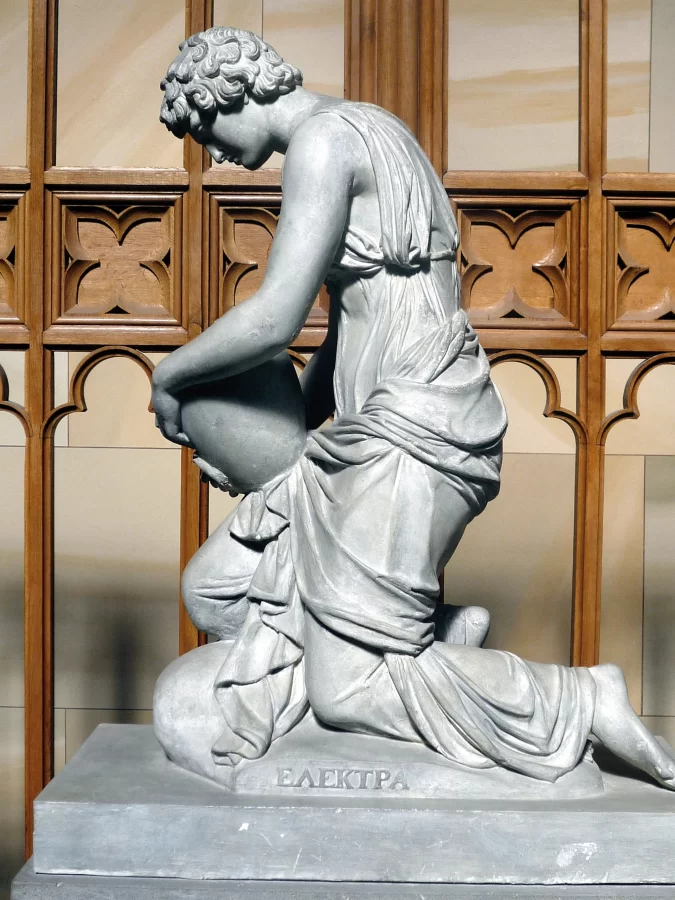
“Elektra”, a sculpture by Christian Friedrich Tieck, 1824,
photograph by Manfred Brückels, Creative Commons Attribution-Share Alike 3.0
In Greek mythology the House of Atreus is a rich source of drama: all three of the great tragedians wrote about the revenge of Orestes on his mother following the Trojan War. Aeschylus’s Libation Bearers focuses primarily on Orestes, but Electra is also key, and in both Euripides’ and Sophocles’ eponymous works Electra takes centre stage. Together these plays give us a wonderful opportunity to compare three representations of a single character.
The study will start with detailed study of Sophocles’ Electra, probably the last of the plays to be written and performed. This version of Electra – written shortly before Sophocles’ death in his nineties – offers perhaps the most complex characterisation and has provoked polarised opinions with one critic calling it ‘a combination of matricide and good spirits’!
We will then go on to explore sections of Aeschylus’s Libation Bearers and Euripides’ Electra, to compare the three versions of the grieving daughter and consider the ongoing relevance of this iconic character.
Our primary text will be The Greek Plays: Sixteen Plays by Aeschylus, Sophocles and Euripides, edited by Mary Lefkowitz and James Romm (ISBN 978-0812983098) which contains all three of the plays we will study, but all translations are welcome.
JOINING DETAILS:
- Four two-hour meetings on Zoom led by Susanna Taggart
- Tuesdays, 5.00-7.00 pm (UK), 20 May – 10 June
- £120 for four meetings to include opening notes and resources
Organizer
Time
20 May 2025 5:00 pm - 7:00 pm(GMT+01:00)
Location
VIRTUAL - ON ZOOM
Future Event Times in this Repeating Event Series
Event Details
Portrait of T.S. Eliot by Ellie Koczela, Creative Commons Four Quartets (1943) was written
Event Details

Four Quartets (1943) was written at the end of T.S. Eliot’s poetic career and is considered by some to be his greatest work. The Four Quartets reflects the four seasons and the four elements, with each section having its own attendant landscape. These include the gardens of Burnt Norton, the open fields of East Coker, the small group of rocks that make up The Dry Salvages, and the village of Little Gidding. All of these spaces reflect facets of England in the 1940s while also serving as Eliot’s internal environment, a place where he wrestles with the themes of death, nature and time. The backdrop of the Second World War adds an eerie pertinence to Eliot’s musings as he contemplates his own demise, yet the poem is rarely despairing. ‘What we call the beginning is often the end,’ he states, ‘And to make an end is to make a beginning./ The end is where we start from.’
Contrary to Eliot’s suggestion, we will start at the beginning and work our way to the end (perhaps to look back on the beginning with new eyes). The study takes place over four weeks every Monday with a break in the middle:
26 May: Burnt Norton
2 June: East Coker
9 June – break, no meeting
16 June: The Dry Salvages
23 June: Little Gidding
JOINING DETAILS:
- Four meeting study led by Karina Jakubowicz on Zoom
- Mondays, 26 May – 23 June (with no meeting on 9 June), 6.00-8.00 pm (BST)
- £130 for four two-hour meetings
- Please use this link to share details
Organizer
Time
26 May 2025 6:00 pm - 8:00 pm(GMT+01:00)
Location
VIRTUAL - ON ZOOM
Future Event Times in this Repeating Event Series
June 2025
Event Details
Event Details
The magnificent Pedro Almodóvar weaves melodrama, camp, a love of theatre and film, and exquisite human emotion into one of his most powerful, gorgeous, and masterful films. Manuela (Cecilia Roth), a loving single mother and hard-working nurse, has fashioned a comfortable life for herself and her teenage son, Estaban, an aspiring writer. After his sudden and tragic death, Manuela learns that Estaban’s final wish was to know his father, the man she abandoned when she was pregnant 18 years earlier. Returning to Barcelona in search of him, Manuela overcomes her grief and becomes an ersatz mother and caregiver to a colourful chosen family: a pregnant nun (Penélope Cruz), a transgender prostitute (Antonia San Juan), and two troubled actresses. A phenomenal masterwork of beauty, humour and compassion, Almodóvar‘s Oscar-winning film celebrated its 25th anniversary last year.
All About My Mother represents a pivotal moment in the famous auteur’s developing oeuvre, what some critics have referred to as his “mature ‘blue period’” (as opposed to the earlier, more florid, ‘rose’ films—think Women on the Verge of a Nervous Breakdown). In addition to the distinct shift in visual palette (from fiery reds to cool blues), All About My Mother, unlike Almodovar’s earlier films, is characterised by a more sombre mood (befitting its elegiac theme) and a greater psychological complexity of its characters. Here, Almodovar moves firmly into the classic Hollywood genre of melodrama which he then, over the next two decades, refines into something unmistakably his own.
Almodóvar’s psychological examination of grief and loss in All About My Mother has as its focus the thematic concerns of classic Hollywood melodrama: female solidarity; motherhood, family and domesticity; crisis, illness and accident; secrets, lies and chance encounters; theatricality, performativity and identity. It is a ‘self-conscious’ film, calling attention to itself with its endless cinematic and theatrical intertexts and ‘retroactive’ serial bonds with earlier films, reminding us of our role as active spectators.
Our study will be a closer examination of Almodovar’s use of the melodrama as a vehicle for his persistent concerns: art, performativity, theatricality, gender, sexuality, identity, history, memory (and forgetting, a personal and collective desmemoria associated with attempts to suppress Spain’s Fascist past), and nurturing communal bonds vs. the sense of alienation attendant upon their rupture, often through forced urban migration.
Here are just a few of the themes and questions we will address together:
- Does Almodovar’s film still have the capacity to startle us today with its continued relevance and its initial prescience?
- How does the classic Hollywood genre of melodrama, a rich and potent source of visual and affective pleasure, actually function as a form of resistance against the very societal structures and values it would seem to honour?
- How does Almodovar understand his female characters, articulating an implied political position which privileges a humanist, feminine ethic of care?
- How does the melodramatic mise en scene (set design, costume, props, blocking of actors, lighting and framing) serve to illuminate unconscious dynamics for which the characters have no words?
- How does All About My Mother reflect an ‘elegiac consciousness’; as a highly stylised and formal rendering of grief, in what ways does Almodovar appropriate the tropes of the poetic literary elegy for his own purposes?

JOINING DETAILS:
- The Art of Film #3: Pedro Almodovar’s All About My Mother (1999)
- Two 2.5 hour sessions on Zoom led by John Allemand
- Sundays, 1 and 8 June 2025, 4.00—6.30 pm BST
- 2024 marked the 25th anniversary of All About My Mother (1999): Academy Award winner for Best Foreign Film (2000), BAFTA Award for Best Director and Best Foreign Film (2000) and Cannes Film Festival Award for Best Director.
- £125.00 for five hour study over two sessions, to include background notes and resources (N.B. participants in this study will be limited to twelve).
- We will show selected clips from the film during the study sessions, but participants are also asked to watch the film closely in advance (available on Amazon Prime, Apple TV and the Criterion Channel).
- To share information about this study please use the link here.
Organizer
Time
1 June 2025 4:00 pm - 6:30 pm(GMT+01:00)
Location
VIRTUAL - ON ZOOM
Future Event Times in this Repeating Event Series
Event Details
Photo of Walt Whitman by George Collins Cox, Public domain, via Wikimedia Commons
Event Details
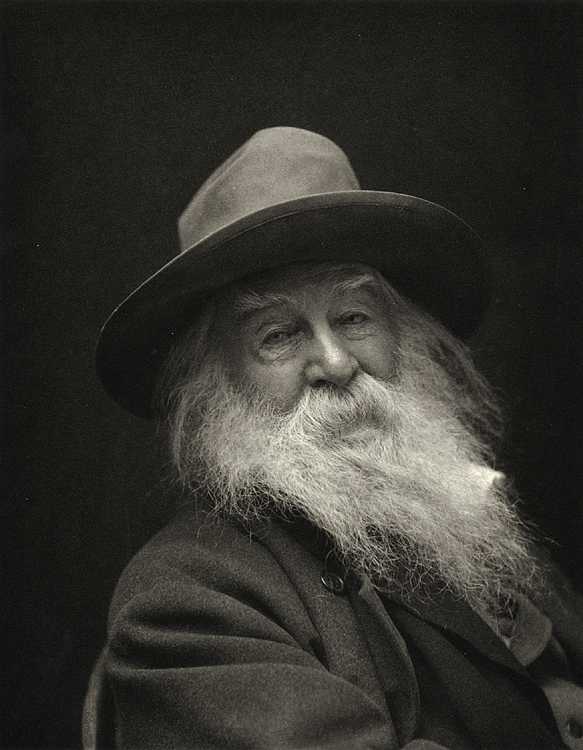
‘Do I contradict myself? Very well then I contradict myself,
(I am large, I contain multitudes)‘From Song of Myself (1892)
American poet Walt Whitman (1819-1892) forever changed the literary landscape of his own time and influenced generations of readers and poets who followed (William Carlos Williams, Allen Ginsberg and Fernando Pessoa, to name a few). Whitman startles us with his radical rejection of tradition together with an uncontained celebration of love, friendship, democracy and nature.
How can we, in our challenging times, connect to Whitman’s passionate and thunderous celebration of man and nature? Can his poetry add depth to our own dismay at war, climate emergency and ailing democracy? Can it offer us a literary way forward?
The summer of 2025 seems exactly the right time to be reading Whitman. His poetry is irresistible both for its oceanic lust for life and its unshakable freedom.
In this introductory study we will explore selections from two of Whitman’s iconic ‘songs’, in which his enthusiastic voice and powerful verse speak directly to us, beckoning us to join him on his poetic road.
JOINING DETAILS:
- Four two-hour meetings led by Vivien Kogut
- £120 for four meetings, to include opening notes and resources
- Wednesdays, 4-25 June, 5.30-7.30 pm (UK)
- 4 June: Song of Myself
- 11 June: Song of Myself
- 18 June: Song of the Open Road
- 25 June: Song of the Open Road
Organizer
Time
4 June 2025 5:30 pm - 7:30 pm(GMT+01:00)
Location
VIRTUAL - ON ZOOM
Future Event Times in this Repeating Event Series
Event Details
The poet Sappho was so revered by the Ancient Greeks that Plato called
Event Details
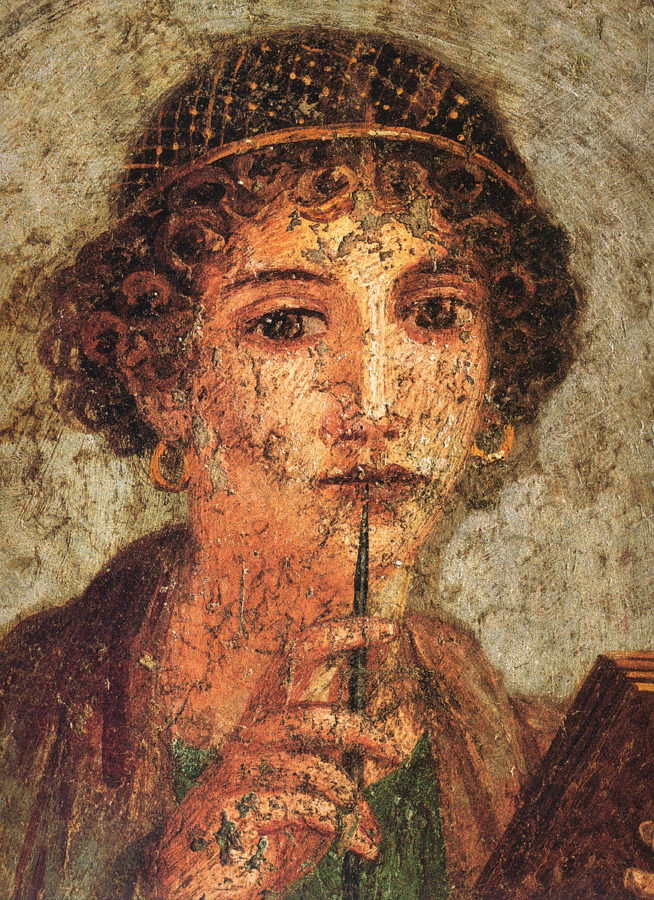
The poet Sappho was so revered by the Ancient Greeks that Plato called her the Tenth Muse, and so famous that her image appeared on coins. She was admired for her technical virtuosity and development of the lyric form but also her emotional honesty – speaking directly to the reader with the intimacy of simple speech. Although mainly fragments of her poems have survived, some only a few lines long, her influence and esteem remain to this day.
Hymn to Aphrodite is the only poem by Sappho known to be complete. Over seven stanzas it contains an invocation to Aphrodite and a plea for help in securing the love of the woman who has so far spurned her. Passionate and at times ambiguous, the reader is left wondering if the goddess of love’s intervention will be of any help at all.
Through repeated readings, analysis and discussion we will work towards an understanding of Sappho’s legacy and enduring appeal.
JOINING DETAILS:
- Single meeting study led by Caroline Hammond
- Wednesday 4 June 2025, 6.00 – 8.00 pm (BST)
- £30 to include background materials and opening notes
- Please use this link to share details
Organizer
Time
4 June 2025 6:00 pm - 8:00 pm(GMT+01:00)
Location
VIRTUAL - ON ZOOM
Event Details
The Party by Vanessa Bell, photograph by Karina Jakubowicz
Event Details

This summer many of us will be celebrating one hundred years since the publication of Virginia Woolf’s Mrs Dalloway, but there’s more to this novel than meets the eye.
Mrs Dalloway began as a short story titled Mrs Dalloway in Bond Street. It was published in 1923 and led to Woolf writing one of the 20th century’s best loved books. Few people realise that when she completed Mrs Dalloway, she felt compelled to return to the scene described in its final pages and wrote six stories about Clarissa’s party and her guests. In these works (not published until after her death) we meet a host of characters both new and familiar: there’s Mrs Vallance, who reminisces about her past in Scotland, Lily Everit, who is glowing after having received a good mark on a college essay, and (of course) Clarissa Dalloway herself, who flits through the room – there one minute and gone the next.
You do not have to have read any Woolf or be familiar with Mrs Dalloway to enjoy this study. Some may wish to make this preparatory reading for the novel, while others will want to use it to expand on their understanding of the text. This also serves as background reading for To the Lighthouse, the novel Woolf wrote after completing these stories. Looking through them we might notice several similar themes such as nostalgia, the figure of the hostess, and the archetype of the young, intellectual woman who struggles in her shadow.
JOINING DETAILS:
- Four meeting study led by Karina Jakubowicz on Zoom
- Tuesdays, 10 June – 1 July, 6.00-8.00 pm (BST)
- Schedule:
10 June – Mrs Dalloway in Bond Street paired with the opening of the novel Mrs Dalloway
17 June – The Man Who Loved His Kind and The Introduction
24 June – Ancestors and Together and Apart
1 July – The New Dress and A Summing Up - Texts will be provided
- £130 for four sessions
- Please use this link to share details
Organizer
Time
10 June 2025 6:00 pm - 8:00 pm(GMT+01:00)
Location
VIRTUAL - ON ZOOM
Future Event Times in this Repeating Event Series
Event Details
Photograph by United Press International, Public domain, via Wikimedia Commons Albert Camus finished
Event Details

Albert Camus finished writing L’Étranger in May 1940, when he was not yet 27 years old. The novel was published in April 1942 and has since become one of the best known books in French literature. According to the critic and translator Alice Kaplan it “changed the history of modern literature”. Part of a trilogy on ‘the absurd’ (Camus wrote at the same time the play Caligula and the philosophical essay The Myth of Sisyphus), L’Etranger has been read in a variety of ways: as an existential treatise, as an indictment of colonialism, as a study in alienation, as a morality novel. However, in the face of the indifference of the main character, it is the vividness of the scenes and the details of the small characters that stay with us: the whining of the dog, the gait of the mother’s fiancé. The murder and the trial are bathed in colours: the bright yellow sun at the beach, the grey prison cell.
This is a book one does not forget. Deceptively easy to read, it is part of the secondary school curriculum in France, and appears on the French GCSE-level syllabus in England too. I have even seen it taught to students just beginning to learn French, because Camus writes in simple and direct sentences. Today, young people still read it as a ‘coming of age’ rite of passage. A film was made (Visconti), a song composed (The Cure) while many essays have been written and classes taught on the meaning of this book.
Why read the book now? What is its message? This is a novel that constantly surprises and opens new possibilities. Recently, the Algerian author Kamel Daoud published The Meursault Investigation, a story that finally names the Arab murder victim and tells the story from the point of view of his family today. Reading – or rereading – L’Étranger can be a new and enlightening experience, come and join us!
JOINING DETAILS:
- Four-meeting study on Zoom, led by Emilia Steuerman
- Thursdays, 6.00-8.00 pm (UK), 12 June – 3 July 2025
- We will read Sandra Smith’s translation: The Outsider, Albert Camus (Penguin Modern Classics, ISBN-13: 978-0141198064).
- £120 for four two-hour meetings, to include background notes and resources.
Organizer
Time
12 June 2025 6:00 pm - 8:00 am(GMT+01:00)
Location
VIRTUAL - ON ZOOM
Event Details
Event Details
To mark 100 years since the publication of Virginia Woolf’s Mrs Dalloway in 1925, we invite you to join us at the fascinating Cinema Museum London (which is not regularly open and is worth a visit in itself) for a special showing of The Hours on 13 June, the date in 2023 when Mrs Dalloway embarked on her walk through the streets of London.
The centenary of the publication of Mrs Dalloway has given us a perfect opportunity to approach the innovative and multi-layered text of this ground-breaking book with new vigour. As part of our celebration of the anniversary we will show The Hours, the 2002 film based on Michael Cunningham’s acclaimed novel. Adapted by David Hare and with a stellar cast including Nicole Kidman, Meryl Streep and Julianne Moore, the film portrays the lives of three women, all facing heart-breaking realities at different times, their different stories bound into a whole by the novel Mrs Dalloway.
The evening will begin at 7.00pm with a presentation about the film and its relationship to by novel by LitSalon founding director Toby Brothers and fellow LitSalon facilitator, Woolf scholar Karina Jakubowicz. Toby and Karina are particularly interested in examining the shifts between Woolf’s original idea for Mrs Dalloway and how this vision has been reconsidered across time and in different genres. Aspects that may have seemed muted in Woolf’s original construction – perhaps most notably the expression of female desire – become more vivid in later interpretations. What are the risks of this kind of re-writing? What are the possibilities?
There will be opportunities for questions from the audience before a short intermission (refreshments available) and the film will be shown from 8.00pm. We expect the event to finish at around 10.00pm.
The Cinema Museum is located in Kennington, an easy walk or bus ride from Kennington or Elephant and Castle tube stations.
EVENT DETAILS:
- Presentation and film, Friday 13 June 2025, 7.00-10.00pm (doors open at 6.30pm)
- The Cinema Museum, 2 Dugard Way (off Renfrew Road), London SE11 4TH
- Tickets bookable in advance at £15.00 each (plus £0.95 booking fee) using the Cinema Museum’s booking system here.
Organizer
Time
13 June 2025 7:00 pm - 10:00 pm(GMT+01:00)
Location
The Cinema Museum London
2 Dugard Way, Renfrew Rd, London SE11 4TH
Event Details
This is the fourth in a series of single session studies on Shakespeare’s Sonnets. Participants are
Event Details
This is the fourth in a series of single session studies on Shakespeare’s Sonnets. Participants are welcome to join as few or many sessions as they please.
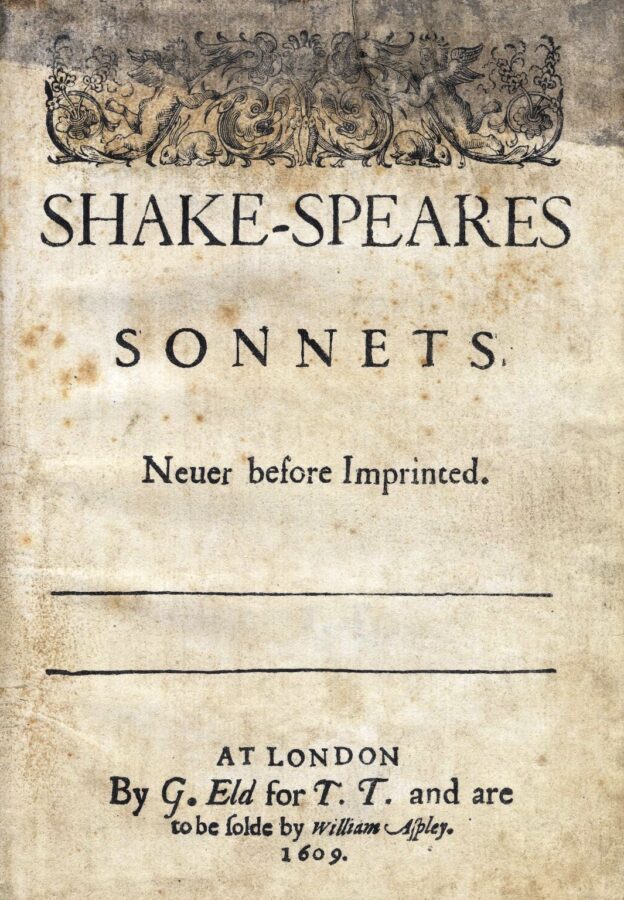
‘There is not a part of the writings of this Poet wherein is found in equal compass a greater number of exquisite feelings felicitously expressed.’
William Wordsworth on Shakespeare’s Sonnets
Shakespeare’s sonnets have inspired, fascinated and disturbed readers for centuries. Full of mystery and imagination, they dazzle us even as they drive us mad: Who is the fair youth to whom so many of these sonnets are addressed? Who is the dark lady, the complex beloved of so many others? Who is the rival poet and what power does he possess? Are these lyric expressions of tortured love – among other themes – the key to understanding the mysterious life of Shakespeare, or are they not autobiographical at all?
Through close analysis and hands-on interpretive work, we will examine Shakespeare’s kaleidoscopic exploration of his speaker’s romantic and tortured feelings and experiences.
We are offering these self-contained, individual studies of Shakespeare’s sonnets in a workshop style setting. Over time we will cover all of the 154 sonnets that comprise Shakespeare’s celebrated sequence. Participants are invited to join as few or many sessions as they please.
JOINING DETAILS:
- Share details of this study using this link
- Session 4: Sonnets 12, 13 & 14, facilitated by Julie Sutherland (on Zoom)
- Sunday 15 June, 3.00 – 5.00 pm (UK)
- £25 for two-hour study
- Before the session, Julie Sutherland will send links to online versions or attach specific copies for discussion. It is highly recommended that you print these off before joining this hands-on session. If you have a printed edition, please also have it ready so we can consider variations between texts. Have a notebook and pencil on hand as well!
Organizer
Time
15 June 2025 3:00 pm - 5:00 pm(GMT+01:00)
Location
VIRTUAL - ON ZOOM
Event Details
Composed on 30 May 1887, Hopkins called The Windhover “the best thing I ever
Event Details
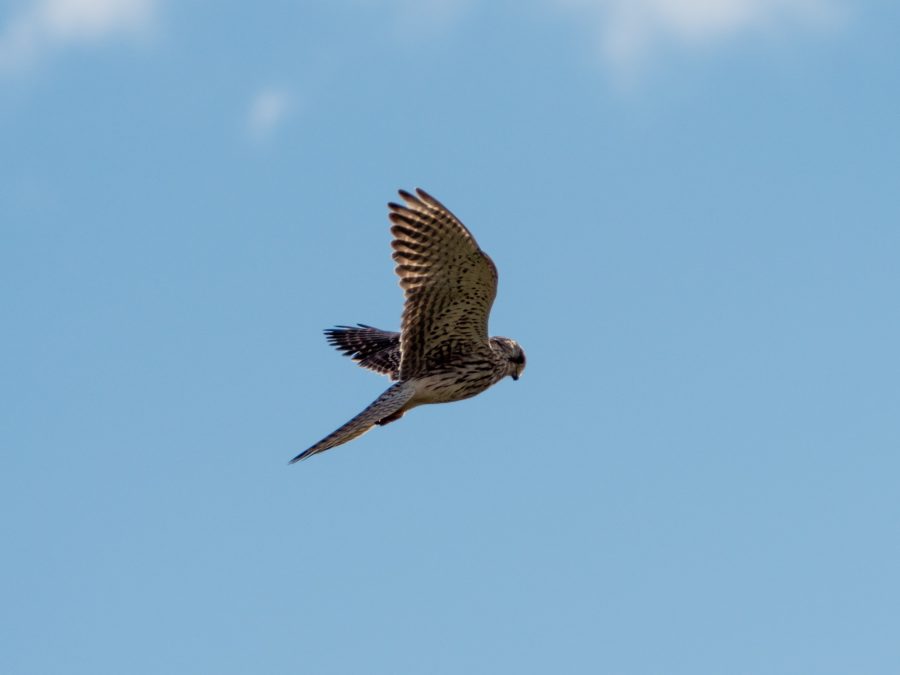
Composed on 30 May 1887, Hopkins called The Windhover “the best thing I ever wrote” and, since its publication it has been celebrated for its daring, innovative language and stunningly accurate evocation of a kestrel in mid-flight. The intensity of the poem’s rhythm and experimental use of form still has the ability to startle us with its freshness and anticipates the work of modernist poets on whom Hopkins was a major influence. The powerful “sprung rhythm” meter makes it a challenging but very satisfying poem to read aloud.
Over the course of two hours we will study The Windhover in depth, look at its form and construction and, through repeated readings, unlock the secrets of this acclaimed poem.
JOINING DETAILS:
- Single meeting study led by Caroline Hammond
- Wednesday 18 June, 6.00 – 8.00 pm (BST)
- £30 to include background materials and opening notes
- Please use this link to share details
Time
18 June 2025 6:00 pm - 8:00 pm(GMT+01:00)
Location
VIRTUAL - ON ZOOM
July 2025
Event Details
ONE PLACE REMAINS ON THIS VOYAGE OF A LIFETIME!
Event Details
ONE PLACE REMAINS ON THIS VOYAGE OF A LIFETIME!
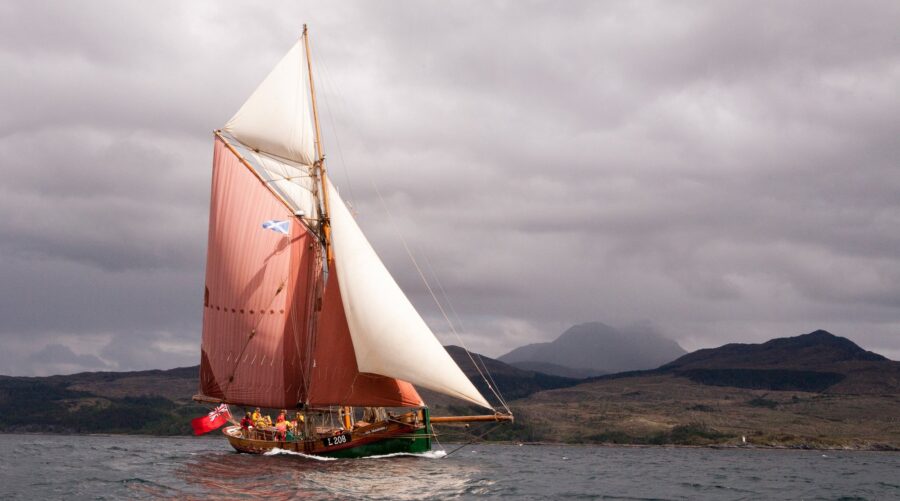
A not-to-be-missed opportunity to complete reading one of the greatest books ever written in English – an extraordinary story of obsession and maritime adventure – over the course of a six-day voyage aboard a traditional sailing ship. Four online meetings will introduce Moby Dick, followed by six study sessions at sea on the Eda Frandsen, a lovingly restored and maintained gaff cutter, originally built in Denmark in 1938. This unique study will allow readers to complement their appreciation of Herman Melville’s text with a practical understanding and experience of the reality of seafaring life under sail.
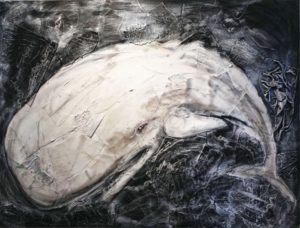
“I am half way in the work . . . It will be a strange sort of book, tho’, I fear; blubber is blubber you know; tho’ you might get oil out of it, the poetry runs as hard as sap from a frozen maple tree;—and to cool the thing up, one must needs throw in a little fancy, which from the nature of the thing, must be ungainly as the gambols of the whales themselves. Yet I mean to give the truth of the thing, spite of this.”
Herman Melville
First published in 1851, Moby Dick ranks on almost any list as one of the greatest works in the English language. Its three famous opening words ‘Call me Ishmael . . .’ together with the image of the one-legged Captain Ahab in mad pursuit of the great white whale, have become cultural icons. This grand—and occasionally grandiose—adventure tale unites the many voices of Herman Melville in a mongrel mix of epic poetry, Shakespearean tragedy, encyclopaedic cataloguing, biblical oratory, and not a small dose of comedy. Melville presents an insightful study of obsession, madness and charismatic leadership that anticipates many of our contemporary conversations about democracy, cosmopolitanism, capitalism and environmentalism.
In 2019, celebration of the 200th year since Herman Melville’s birth initiated a particularly auspicious moment to study this great work, generating rich responses and reconsiderations of a truly amazing book. Philip Hoare (mentioned below as one of the curators of the Moby Dick Big Read project) writes on the contemporary importance of this work in this article Subversive, queer and terrifyingly relevant: Six reasons why Moby Dick is the novel for our times.
“The book features gay marriage, hits out at slavery and imperialism and predicts the climate crisis – 200 years after the birth of its author, Herman Melville, it has never been more important.”
Philip Hoare
Together, artist Angela Cockayne and writer Philip Hoare convened and curated a unique whale symposium and exhibition at Peninsula Arts, the dedicated contemporary art space at Plymouth University. This grew into an extraordinary compilation of art and voices (Tilda Swinton, Stephen Fry and more) – the Moby Dick Big Read – to illuminate each chapter, inspiring and inspired by this vast book.
SALON DETAILS:
- Four two-hour meetings online, followed by six-day study with six nights on board the Eda Frandsen from 3.00pm on Saturday 5 July 2025 to 9.00am on Friday 11 July 2025
- Four online meetings (on Zoom) Wednesdays 5.30-7.30 pm (UK), 28 May, 4, 11, 18 June 2025
- Facilitated by Toby Brothers, Salon Director
- Recommended edition: Moby Dick (Norton Critical Edition, Third Edition 2018), by Herman Melville, edited by Herschel Parker; W.W. Norton & Co. ISBN-13: 978-0393285000
- Cost for four online meetings and six-night voyage with study sessions, including opening notes will be £1,850 per person.
- Participants will be responsible for arranging their own travel to and from our departure and end point, the port of Mallaig on the west coast of the Scottish Highlands, as well as insurance to cover their trip.
- We have just one place (of seven) remaining. If you are interested in joining, please email us using the subject line Moby Dick 2025 giving your name and a phone number on which we may contact you.
- Please note that the voyage will involve sharing confined living and sleeping space while onboard. We do not require you to have nautical skills, but some time spent on sailing boats or camping would be useful so you know what to expect. We ask you to let us know in your email whether you have such experience and to confirm that you are in good physical health.
- Even in summer it is possible that there may be rough seas and weather, so please consider carefully whether you are likely to be adversely affected by these conditions.
- If we are able to offer you a place we will ask for an initial deposit of £100 per person, with the balance due by 31 December 2024.
Organizer
Time
5 July 2025 3:00 pm - 11 July 2025 9:00 am(GMT+01:00)
Location
Mallaig, Scotland
Event Details
This summer at the British Museum, the exhibition Hiroshige: artist
Event Details

This summer at the British Museum, the exhibition Hiroshige: artist of the open road focuses on the great Japanese printmaker Utagawa Hiroshige (1797–1858): ‘From fashionable figures and energetic city views to remote landscapes and impressions of the natural world, Hiroshige captured many aspects of life in the Japan of his time.’ To complement the exhibition, the LitSalon offers an online study of Japanese Art. We will look at the masters of Japanese prints, Hiroshige and Hokusai, as well as a short overview of Japanese Art. From the Heian period to the Edo, beauty infused nearly every aspect of cultural life: Zen temples and gardens, ceramics, tea ceremonies, haiku poetry, calligraphy, woodblock prints, and dress (kimonos and netsuke).
If you love European art and are curious about Asian art, this study is for you! Find out for yourself why artists such as Van Gogh, Whistler and Monet were so inspired by the arts of Japan.
JOINING DETAILS:
- Five meeting study of Japanese art including the print-makers Hiroshige and Hokusai, led by Sean Forester on Zoom.
- Tuesdays 6.00-8.00 pm (UK)
- 29 July & 5, 12, 19, 26 August 2025
- £150 for five two-hour meetings
- Recommended books: Hiroshige by Adele Schlombs, ISBN-13: 978-3836519632; How to Look at Japanese Art by Stephen Addiss, ISBN-13: 978-1626542822.
- We also hope to arrange an informal visit to the exhibition at the British Museum in early September, shortly before it ends. Please email us using the subject line ‘Hiroshige visit’ if you are interested in joining the group visit.
- Use this link to share details of the study.
Organizer
Time
29 July 2025 6:00 pm - 8:00 pm(GMT+01:00)
Location
VIRTUAL - ON ZOOM
Future Event Times in this Repeating Event Series
August 2025
Event Details
Event Details
‘When shall we three meet again?’ Joel Coen’s visually arresting adaptation of William Shakespeare’s Macbeth opens, perhaps ironically, on sound and text in an otherwise black void. After the fleeting appearance of the single word, ‘WHEN’, audiences are encompassed in darkness, cut through by Kathryn Hunter’s smoke-shattered delivery of the witches’ famous line.
Audiences are drawn from this blackness into a noirish tale of blood and betrayal. Reinvented by Coen’s sharp vision, the terrifying Macbeth (Denzel Washington) and his formidable wife (Frances McDormand) are caught in a claustrophobic nightmare that is literalized by the frames that confine them to their fate: shot in the squarish ‘Academy ratio’, the Macbeths are cornered by a destiny that at turns thrills and horrifies them.
In his first solo venture away from his brother Ethan (with whom he brought us such celebrated works as Fargo and No Country for Old Men), Joel Coen draws on Shakespeare’s verbal artistry and his predecessors’ masterful film interpretations to deliver a raw-boned and redefined version of this great tragedy, one that feels both familiar and strange.
Join John Allemand and Julie Sutherland in a 2-week study of Joel Coen’s The Tragedy of Macbeth (2021). As with previous Art of Film studies (Thelma & Louse, The Graduate), Julie and John will show select clips for discussion during the study, as well as leading a conversation about the film more generally. This study is for cineastes and Shakespeare lovers alike. No previous knowledge of the play is necessary, but participants are requested to watch the film in advance of the study.
As a separate but complementary series, Julie Sutherland is offering a 7-week study of Shakespeare’s Macbeth, beginning shortly after the film study closes (Wednesdays, 13 August-24 September). Participants in the Art of Film’s The Tragedy of Macbeth may be interested in joining this related event.
Questions to consider:
- Does Coen’s visual ingenuity complement, challenge, or compromise Shakespeare’s verbal mastery?
- Coen’s Macbeth was written and released during the height of COVID-19. (The play itself was potentially written during an outbreak of the plague.) How evident is the concept of pandemic in Coen’s adaptation?
- In Coen’s adaptation, Macbeth and Lady Macbeth are in their sixties. What is the effect of presenting an unusually ageing Macbeth and Lady Macbeth?
JOINING DETAILS:
- A five-hour LitSalon ‘Art of Film’ study over two sessions
- Friday 1 August and 8 August 2025, 4.00-6.30pm (UK/BST) on Zoom
- Discussion led by Julie Sutherland and John Allemand
- Joel Coen’s The Tragedy of Macbeth is available on Apple TV as well as on some Amazon Prime subscriptions. Films can be rented on Apple TV without a subscription.
- £125 for a two-session, five-hour study, including background notes and resources (N.B. participants in this study will be limited to a maximum of 12).
- Please use this link to share details of the study.
Time
1 August 2025 4:00 pm - 6:30 pm(GMT+01:00)
Location
VIRTUAL - ON ZOOM
Event Details
Photo by Nicole King on Unsplash
Event Details

‘This is a waterfall.’
‘Yup. You ever seen a waterfall, Klara?’
‘Yes. I saw one in a magazine in the store. And look! You’re eating, right in front of the waterfall.’
‘You can do that at Morgan’s Falls. Have lunch while the spray covers you. You’re eating your food then you realize your shirt’s soaked at the back.’
‘That can’t be good for you, Josie,’
Klara is one of many Artificial Friends (AFs) in a store. She waits patiently to be picked out and taken home, but Klara is neither the latest nor the most sophisticated model. Despite her obvious limitations, the store manager knows that Klara stands apart from the newer range of AF models in a special way. Klara notices details about human beings, and she cares about what she sees.
Nobel laureate Kazuo Ishiguro says that the initial idea for Klara came from a short story he wrote for small children. He was advised that the idea of an android would be too frightening so he extended the idea into a novel for adults but retained the viewpoint of a young child. Klara, as an outsider narrator, focuses on specific aspects of life. Her commercial purpose is to aid with loneliness and this is the lens through which she sees the world.
Kazuo Ishiguro published his first novel, A Pale View of the Hills, in 1982. In the years since, he has written only seven more. He says that writing is not easy for him and that his primary aim as a writer is to create works that stay with the reader long after they have finished reading the book. Although Ishiguro accepts the categorisation of a Science Fiction writer, he is less comfortable with the reductive element implied by the categorisation of fiction into ‘genre’ writing. In his 2017 Nobel acceptance speech, he said: “Good writing and good reading will break down barriers. We may even find a new idea, a great humane vision, around which to rally.”
JOINING DETAILS:
- Four meeting study led by Nicky von Fraunhofer and Jane Wymark on Zoom
- Wednesdays 6-27 August 2025, 6.00 – 8.00 pm (BST)
- Klara and the Sun by Kazuo Ishiguro, 2021, paperback, Faber ISBN 9780571364909
- £160 for four meetings
- Please use this link to share details
Time
6 August 2025 6:00 pm - 8:00 pm(GMT+01:00)
Location
VIRTUAL - ON ZOOM
Future Event Times in this Repeating Event Series
Event Details
Tristan and Isolde with the Potion, John William Waterhouse, Public domain, via Wikimedia Commons
Event Details

Love, lust, honour, betrayal: this study will explore the doomed lovers Tristan and Isolde (Yseult). We will read selections from the original Celtic legend as told by by Anglo-Norman poet Thomas of Britain (1170) and the medieval German version by Gottfried von Strassburg (1215). We will also listen to Wagner’s musical interpretation in the opera Tristan und Isolde and discuss the impact of a different artistic medium on our response to the story.
This is London Literary Salon’s first experiment with adding a musical element to the discussion of literature and will be purely experiential, no knowledge of music theory is required. If you have enjoyed our discussions of literature and visual art, we invite you to drink the love potion with Tristan and Isolde and surrender yourself to the power of poetry and music combined as we consider why Tristan is considered one of the greatest operas of the 19th century.
JOINING DETAILS:
- Four week study led by Sean Forester on Zoom
- Thursdays, 7, 14, 21 & 28 August 2025, 5.30-7.30 pm (UK)
- Text: Tristan: With the Surviving Fragments of the ‘Tristran of Thomas’ (Penguin Classics) by Gottfried von Strassburg, Translated by A.T. Hatto, ISBN-13: 978-0140440980
- Music: Tristan und Isolde by Richard Wagner
- Use this link to share details of the study.
- £120 for four meetings, to include opening notes and background resources.
Organizer
Time
7 August 2025 5:30 pm - 7:30 pm(GMT+01:00)
Location
VIRTUAL - ON ZOOM
Future Event Times in this Repeating Event Series
Event Details
Macbeth and the Witches, George Romney, via Wikimedia Commons
Event Details

Join Julie Sutherland in a gripping journey through one of Shakespeare’s most terrifying and psychologically rich tragedies: Macbeth. Over the course of seven weeks, we shall linger in the play’s dusky shadows, engaging in a close reading that draws not only from the text but also from the dark corners of our own time. Macbeth is a study of ambition and conscience. It is a story of political power gained and held through violence. It is a tale of the terrible cost of prophecy and paranoia.
As we follow the tyrannical Macbeth and his cunning wife, Lady Macbeth, through their spiral into butchery and madness, we’ll explore how Shakespeare creates a world where moral boundaries dissolve and natural law gives way to supernatural terror.
Though drenched in the blood and fog of medieval Scotland, Macbeth speaks with unsettling clarity to the 21st-century landscape—where political rhetoric often veils ruthless pursuit, where public figures are shadowed by private demons, and where fear, spectacle and manipulation shape the fate of nations. In Macbeth’s world, as in our own, power is both intoxicating and deadly.
As we tread this blood-soaked ground together, perhaps we’ll see that Macbeth’s dagger, though imagined, still casts a long and chilling shadow.
** As a separate but complementary series, Julie Sutherland and John Allemand are offering a 2-week study of Joel Coen’s film adaptation of The Tragedy of Macbeth, beginning just before the play study begins. Participants in the Shakespeare play study may be interested in joining this corresponding event (Fridays, 1 & 8 August).
JOINING DETAILS:
- Recommended edition: Macbeth: The Arden Shakespeare; 3rd edition (26 Feb. 2015, editors Clark & Mason) ISBN-10: 1904271413
- Seven week study led by Julie Sutherland
- Wednesdays, 5.00-7.00 pm UK time
- 13 August – 24 September 2025
- £210 for seven meetings, including pre-session notes and supplementary resources.
- To share details of this study please use this link.
Organizer
Time
13 August 2025 5:00 pm - 7:00 pm(GMT+01:00)
Location
VIRTUAL - ON ZOOM
September 2025
Event Details
The Iliad is one of the first written works in Western
Event Details
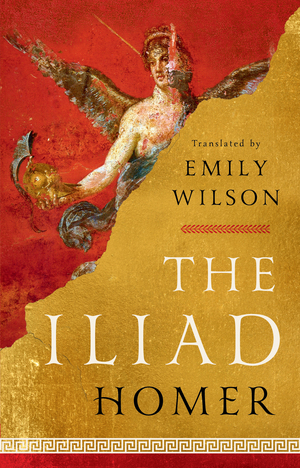
The Iliad is one of the first written works in Western Literature, and undoubtedly one of the greatest. Although the story of its composition and recording remains a subject of scholarly debate, we can tentatively date it to the late 8th or early 7th Century BCE. It is impossible to overestimate The Iliad’s importance, which extends beyond literature to influence art, culture, society and morals – Alexander the Great carried the copy given to him by Aristotle on his campaigns and John Keats was inspired to write one of his most perfect sonnets after a night of reading.
The Iliad is a thrilling and heart-wrenching poem about war, human mortality and loss. But it is also about friendship, families, the natural world, love and redemption. One of the joys of the work, and perhaps why re-reading is so rewarding, is the richness and relatability of Homer’s world. Richness takes many forms, including a huge cast of characters, vivid language and similes, and how invested we become in this epic story. Homer invites us into a world that is both familiar and strange. The society is patriarchal, slave-holding, monarchical and polytheistic. The text is more than two and a half thousand years old, yet the characters speak directly to our own experience. Who hasn’t feared for a loved one? Or been mad at their boss (hopefully not enough to almost draw a sword against them)? Or wondered at the beauty of the sunrise?
This year we’ll also be bringing an environmental lens to our reading. We’ll discuss ways The Iliad may have contributed to the current climate crisis. Whether the work includes warnings and an awareness of the dangers of environmental damage. And how we might use this knowledge to drive change.
Emily Wilson’s new translation of The Iliad was published to acclaim in 2023.
“Wilson’s approachable storytelling tone invites us in, only to startle us with eruptions of beauty… Wilson’s transformation of such a familiar and foundational work is astonishing.”
Rebecca Newberger Goldstein, The Atlantic
Using iambic pentameter – the rhythm of Chaucer, Shakespeare and Milton – Wilson’s translation has the lyrical quality the Ancient Greeks would have experienced in a work so closely linked to performance. Her writing is brisk and readable, bringing a fresh perspective to an ancient tale.
We will combine a close reading of the text and bonus features: poems and art inspired by the epic, consideration of the psychology of war, and images of museum exhibits. We’ll also draw on Edith Hall’s new book Epic of the Earth (ISBN 978-0-300-27558-2) but it’s not necessary either to have a copy or to have read this in advance of the study.
The study is offered in two six-week sections. The first six sessions covering books 1-12 will be followed by a two-week break and then six sessions for the final 12 books.
JOINING DETAILS:
- Section 1: Six two-hour meetings on Zoom, from 6-8pm (UK) on consecutive Tuesdays from 9 September to 14 October led by Caroline Hammond and Susanna Taggart. Following a two-week break there will be a further six two-hour meetings on Zoom, from 6-8pm (UK) on consecutive Tuesdays from 4 November to 9 December.
- We’ll use Emily Wilson’s translation of Homer’s Iliad (ISBN-10: 1324076143 ; ISBN-13: 978-1324076148).
- £210 for the first six meetings with two facilitators (participants in Section 1 will be given priority when the second set is posted for booking) to include opening notes and resources.
- Please use this link to share details of the study.
Time
9 September 2025 6:00 pm - 8:00 pm(GMT+01:00)
Location
VIRTUAL - ON ZOOM
Future Event Times in this Repeating Event Series
Event Details
Event Details
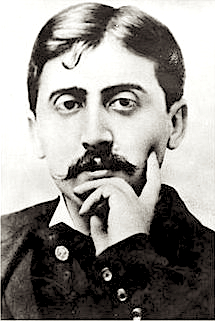
For September 2025, the London Literary Salon invites you to join a five-day study visiting the Paris of Proust and some of the most extraordinary visual artists of the nineteenth and early twentieth centuries.
Beauty, visual art and sense of place are central to A la Recherche du Temps Perdu, and the novel truly comes alive in the author’s beloved Paris. This unique study will be most suitable for those who have read some or all of Proust, but if you are keen to join this trip and have not yet read any of the novel please contact us to discuss. Toby Brothers will lead our literary discussions and Sean Forester will guide the group as we look closely at painting and sculpture. From Classicism and Romanticism, to Realism, Impressionism and Art Nouveau, the art of 19th and early 20th century France has something for everyone!
Ahead of our visit to Paris (and great preparation for anyone considering joining us) Sean is leading two online studies on Art in France: Part 1 begins on 20 February, with Part 2 following in May (both can be booked separately). Toby will offer a special lecture and discussion Why Read Proust in 2025? and her next In Search of Lost Time study begins in September.
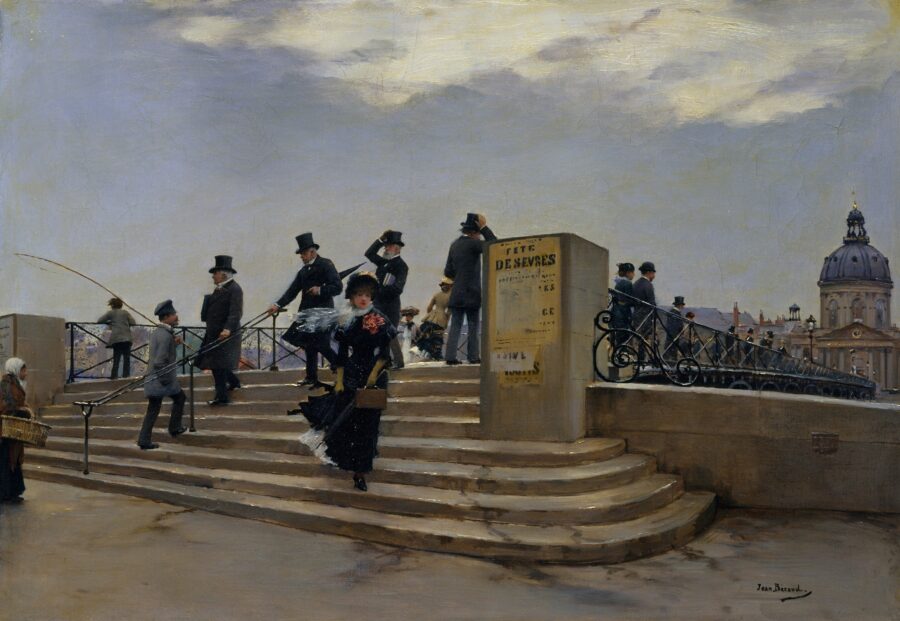
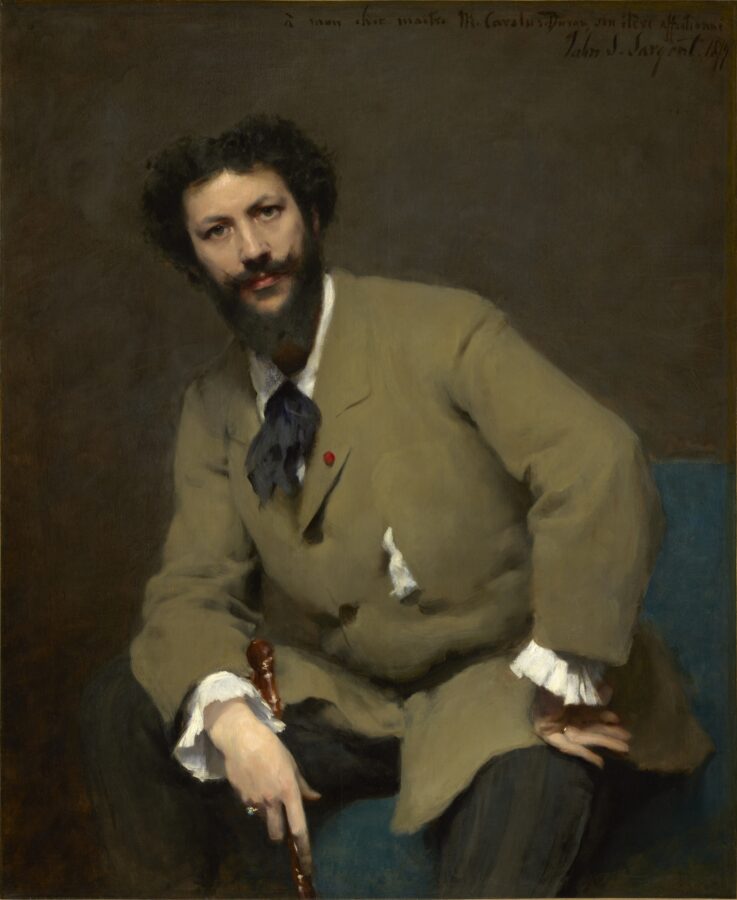

We will be based at the very lovely Proust-dedicated Hôtel Littéraire de Swann, where we have negotiated special rates for participants.
Please note that the hotel cost, travel and transport, food and drink are NOT included in the Salon price of £600 for the five-day visit.
In addition to discussions of the work of Marcel Proust in relation to Paris, we will have two sessions on French art as well as visits to the Louvre, Musée d’Orsay, Musée Rodin and Musée Carnavalet. We will keep you updated as we finalise our day-to-day programme, but we hope also to include either a visit to the Musée de l’Orangerie or a tour of the Opéra Garnier, and we will try to include a walk in the Jardin du Luxembourg and even a drawing lesson en plein air before we leave.
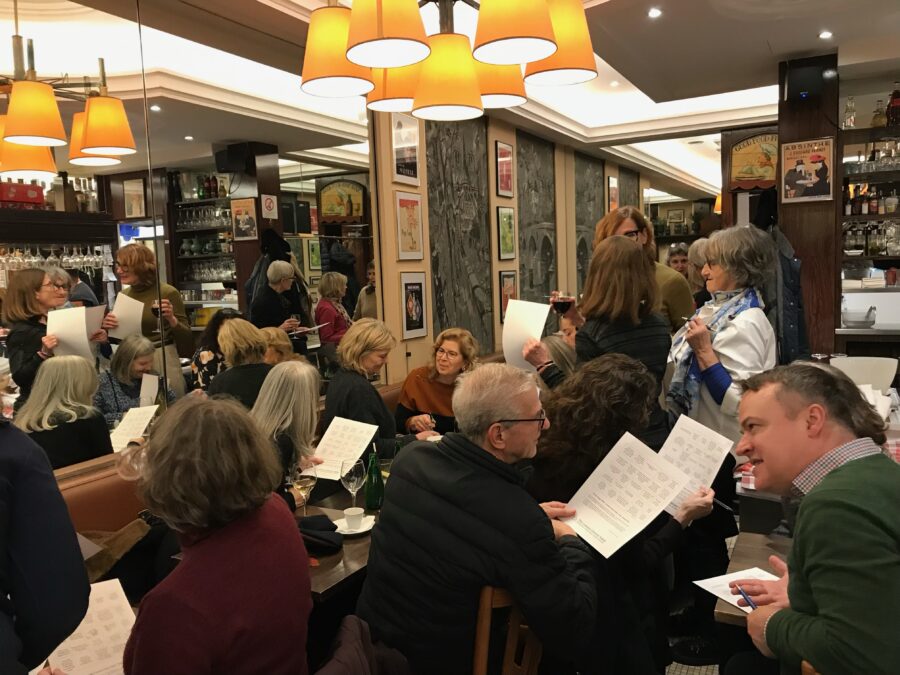
To get a flavour of previous Salon visits to Paris, read Sue Fox’s blog post about Proust in Paris with Toby in 2023!
JOINING DETAILS:
- Share details of this study using this link
- Five-day study in Paris led by Toby Brothers and Sean Forester
- 10-14 September 2025, £600.00 for the study and background notes
- Additional costs: participants are responsible for arranging and paying for their own travel and insurance, accommodation, food and drink. We have negotiated special rates at the hotel for Salon clients and we will arrange group bookings for entrance to museums and galleries which will be charged as extras before departure (at reduced rates wherever possible).
- Some knowledge of the work of Marcel Proust is required to enjoy the literary discussions, please email us if you are interested in joining but have not yet read In Search of Lost Time.
- Although not required, Sean Forester’s two-part Looking at Pictures: Art in France (Part 1 and Part 2) provides an invaluable introduction to this travel study.
- Payment: we understand that you may not want to pay the entire charge at once, so we ask for an initial (non-returnable) deposit of £50 on registration, followed by the balance of £550 by 31 May 2025.
- Refunds: please note that any refunds will be entirely at the discretion of the London Literary Salon, dependent on our ability to fill the place, and will be subject to a charge to cover our administration costs.
Time
10 September 2025 2:30 pm - 14 September 2025 1:00 pm(GMT+02:00)
Location
Paris
Event Details
Every reader finds himself. The
Event Details
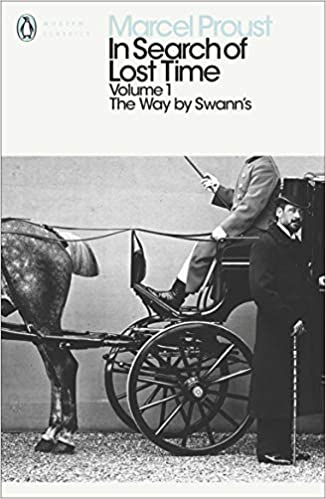
Every reader finds himself. The writer’s work is merely a kind of optical instrument that makes it possible for the reader to discern what, without this book, he would perhaps never have seen in himself.
Marcel Proust
Who hasn’t gazed at this mountain of Modernism and felt daunted, or wondered what could possibly take any writer more than three thousand pages and six or seven volumes to say?
In our study, we enter the Proustian universe through the first volume: this will give readers a glimpse of the breadth and purpose of this carefully constructed creation that Proust uses to reflect on the workings of the mind, memory, imagination and the role of art. Harold Bloom cites In Search of Lost Time as ‘the greatest literary work of comic jealousy’. Proust uses social critique, abundant detail, lyric descriptions and philosophical query to portray a sensitive young mind engaging with the world and human relationships. The narrator’s incredible vision and unique voice develop over the course of the volumes. By studying this first volume, you will acquire the tools needed to complete the epic on your own if you are inspired, or continue with the Salon study if this is working for you. We continue to ask, could there be a better moment in history to go in search of Lost Time?
This will be the ninth troop I have led through Proust’s massive work. Please be assured that registering for the first volume does NOT commit you to continuing, but even though completing the entire cycle with us involves two and a half years of reading together, most people do choose to stay the course (some might say become addicted) and find the work immensely satisfying.
For myself, I would say simply that my time in Proust has changed the way I understand my relationship to the world of art and experience. Here is how one salonista describes the pleasure and work of reading Proust: “This is a velvet jewel of a book that demands the attention of a lover full of enchantment and obsession, we need not get impatient as all good lovers perfect their art in taking their time.”
SALON DETAILS
- Nine week virtual study starting 17 September (N.B. no meetings on 1 and 15 October), for first time readers of In Search of Lost Time. Please note that we sometimes offer a ‘second time around’ study for those who have already completed their first encounter with Proust’s work, please email us if this is of interest.
- Wednesdays 3.00 pm-5.00 pm (UK)
- Facilitated by Salon Director, Toby Brothers
- Cost £300 (includes notes and critical resources)
- Recommended edition: In Search of Lost Time: Volume I, The Way By Swann’s, by Marcel Proust, translated by Lydia Davis, Penguin Modern Classics, ISBN 978-0141180311
- Use this link to share details of the study.
A little background and encouragement:
Proust’s writing requires a wide-awake mind as the reader is drawn into dissecting the world as it is experienced and the way our minds decorate and create memories, values and paradigms of understanding. This sounds so dry, but the wonder is how deeply sensual Proust’s work is — he is most concerned with the experience of intimacy and how this dance between two beings is fractured and reimagined through the lens of perception.
Reading Proust teaches the reader to observe how the world is experienced, to be aware that although we may be tempted to give greater weight to the perceptual universe, it is the entwining of memory, idealised experience (dreams) and relationships with what our senses perceive that moulds our consciousness.
A comment from a previous Proust participant:
” . . . brilliant, frustrating, revealing, engrossing and I am part of what has become a special community of equally frustrated and hugely encouraging students of different ages and backgrounds. Guided by Toby we are full of insights and laughter. We read aloud and discuss the week’s reading. Time flies, brains feel rejuvenated and the weeks go by much more speedily with the Salon to look forward to. Encouragement is key, there are no ‘right’ or ‘wrong’ opinions. In fact the best thing about the Salon is that we all feel valued. What’s not to love!”
Organizer
Time
17 September 2025 3:00 pm - 5:00 pm(GMT+01:00)
Location
VIRTUAL - ON ZOOM
Future Event Times in this Repeating Event Series
Event Details
Every reader finds himself. The
Event Details

Every reader finds himself. The writer’s work is merely a kind of optical instrument that makes it possible for the reader to discern what, without this book, he would perhaps never have seen in himself.
Marcel Proust
Who hasn’t gazed at this mountain of Modernism and felt daunted, or wondered what could possibly take any writer more than three thousand pages and six or seven volumes to say?
In our study, we enter the Proustian universe through the first volume: this will give readers a glimpse of the breadth and purpose of this carefully constructed creation that Proust uses to reflect on the workings of the mind, memory, imagination and the role of art. Harold Bloom cites In Search of Lost Time as ‘the greatest literary work of comic jealousy’. Proust uses social critique, abundant detail, lyric descriptions and philosophical query to portray a sensitive young mind engaging with the world and human relationships. The narrator’s incredible vision and unique voice develop over the course of the volumes. By studying this first volume, you will acquire the tools needed to complete the epic on your own if you are inspired, or continue with the Salon study if this is working for you. We continue to ask, could there be a better moment in history to go in search of Lost Time?
This will be the ninth troop I have led through Proust’s massive work. Please be assured that registering for the first volume does NOT commit you to continuing, but even though completing the entire cycle with us involves two and a half years of reading together, most people do choose to stay the course (some might say become addicted) and find the work immensely satisfying.
For myself, I would say simply that my time in Proust has changed the way I understand my relationship to the world of art and experience. Here is how one salonista describes the pleasure and work of reading Proust: “This is a velvet jewel of a book that demands the attention of a lover full of enchantment and obsession, we need not get impatient as all good lovers perfect their art in taking their time.”
SALON DETAILS
- Nine week virtual study starting 17 September (N.B. no meetings on 1 and 15 October) for first time readers of In Search of Lost Time. Please note that we sometimes offer a ‘second time around’ study for those who have already completed their first encounter with Proust’s work, please email us if this is of interest.
- Wednesdays 5.30 pm-7.30 pm (UK)
- Facilitated by Salon Director, Toby Brothers
- Cost £300 (includes notes and critical resources)
- Recommended edition: In Search of Lost Time: Volume I, The Way By Swann’s, by Marcel Proust, translated by Lydia Davis, Penguin Modern Classics, ISBN 978-0141180311
- Use this link to share details of the study.
A little background and encouragement:
Proust’s writing requires a wide-awake mind as the reader is drawn into dissecting the world as it is experienced and the way our minds decorate and create memories, values and paradigms of understanding. This sounds so dry, but the wonder is how deeply sensual Proust’s work is — he is most concerned with the experience of intimacy and how this dance between two beings is fractured and reimagined through the lens of perception.
Reading Proust teaches the reader to observe how the world is experienced, to be aware that although we may be tempted to give greater weight to the perceptual universe, it is the entwining of memory, idealised experience (dreams) and relationships with what our senses perceive that moulds our consciousness.
A comment from a previous Proust participant:
” . . . brilliant, frustrating, revealing, engrossing and I am part of what has become a special community of equally frustrated and hugely encouraging students of different ages and backgrounds. Guided by Toby we are full of insights and laughter. We read aloud and discuss the week’s reading. Time flies, brains feel rejuvenated and the weeks go by much more speedily with the Salon to look forward to. Encouragement is key, there are no ‘right’ or ‘wrong’ opinions. In fact the best thing about the Salon is that we all feel valued. What’s not to love!”
Organizer
Time
17 September 2025 5:30 pm - 7:30 pm(GMT+01:00)
Location
VIRTUAL - ON ZOOM
Future Event Times in this Repeating Event Series
Event Details
It has become a Salon tradition to spend some time each autumn on the Cornish coast reading Virginia Woolf’s work and enjoying one of
Event Details
It has become a Salon tradition to spend some time each autumn on the Cornish coast reading Virginia Woolf’s work and enjoying one of the places she loved and in which she spent significant parts of her childhood. In 2025 we are again offering two Woolf studies in St Ives: The Waves (28 September to 1 October) and The Voyage Out (3 to 6 October).
As one of the key members of the celebrated Bloomsbury Group, Woolf is seen primarily as a London writer, yet the Cornish coastal town of St Ives – where she spent many childhood summers – serves as a prism through which we can explore her perspectives on landscape, domesticity and identity.
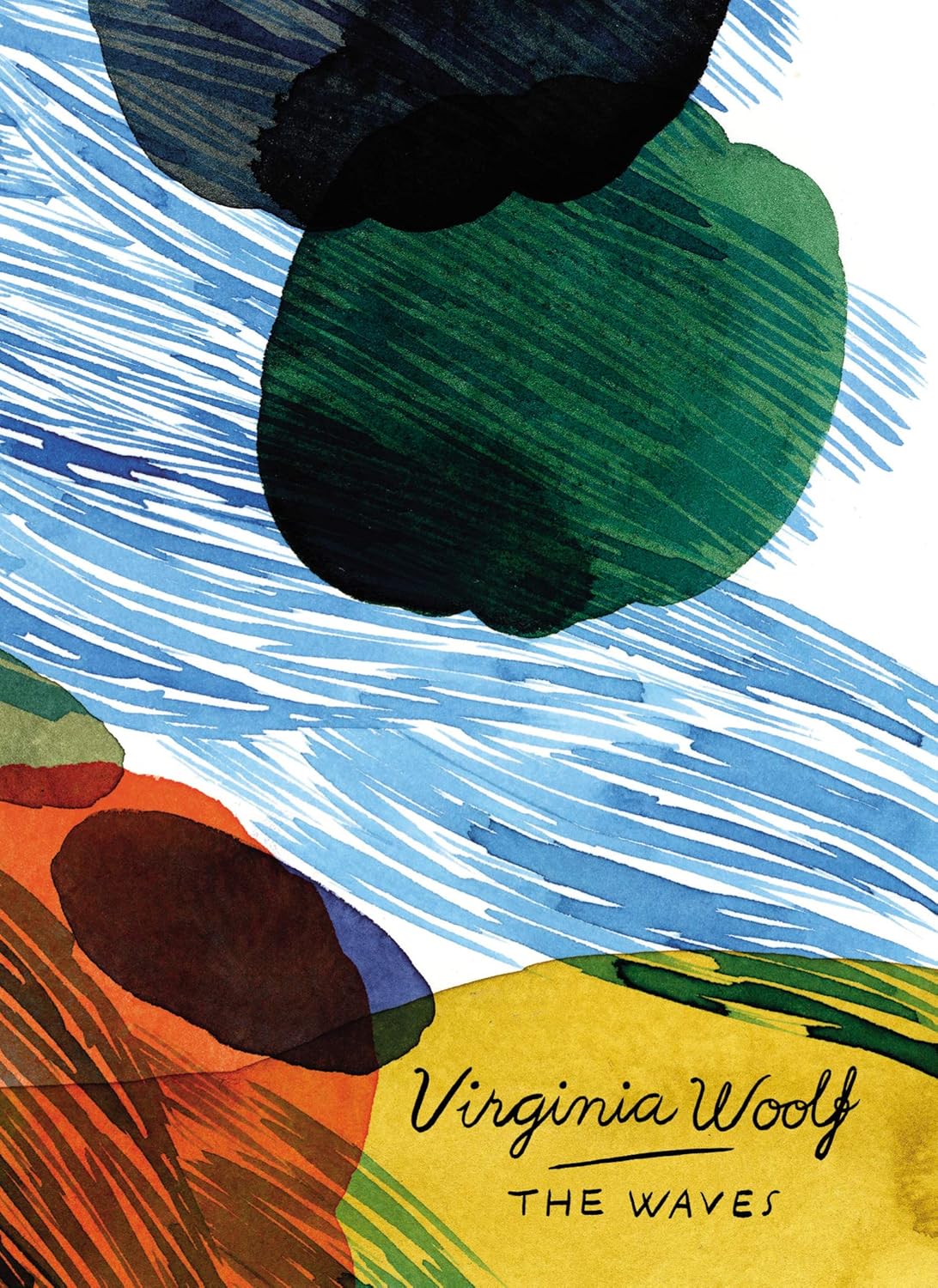
“Thus when I come to shape here at this table between my hands the story of my life and set it before you as a complete thing, I have to recall things gone far, gone deep, sunk into this life or that and become part of it; dreams, too, things surrounding me, and the inmates, those old half-articulate ghosts who keep up their hauntings by day and night; who turn over in their sleep, who utter their confused cries, who put out their phantom fingers and clutch at me as I try to escape—shadows of people one might have been; unborn selves.”Virginia Woolf, The Waves
Reading Virginia Woolf requires a release of the faculty we have so carefully trained to be grounded in time and fact. Her fluid and probing prose allows such a deep and troubling glimpse into the human heart that one comes away wiser and broader than before. This is not my first floating into The Waves, what I have already experienced makes me want to swim far out into her embracing world of character and reflection.
We invite you to join us in St Ives to explore this lovely place and share the work with a group of other keen minds.
I love this review of The Waves from Goodreads:
‘My umpteenth reading of The Waves and it still floors me. There’s not a wasted word here: Woolf’s attention to rhythm—she was listening to Beethoven’s String Quartet in B-flat Minor, Opus 130 while writing this novel, and Beethoven’s nuances are found in her prose at all turns—and the ways in which she questions subjectivity, interpersonal relations, the ways in which we are connected and yet disparate from those around us are on display here more so than in any of her other fictional works.
‘The last section is sadly not as famous as the last section in Joyce’s Ulysses, but it may well be even more gut-wrenchingly brutal in its philosophical underpinnings and the ways in which Woolf engages with poetics to sustain the flow of her inquiries into what it means to be human. On each reading there is something more to be found here, something more to be learned, something to relish and treasure, some keen diamond-edged truth that slices just as much as it illuminates.’
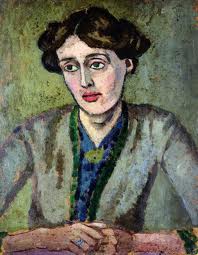
During our visit you will have opportunities to visit the iconic Tate St Ives gallery overlooking the Atlantic Ocean, built between 1988 and 1993 on the site of an old gasworks, and the Barbara Hepworth Museum & Sculpture Garden. If weather allows, there will be an optional boat trip to Godrevy Lighthouse and we also hope to look at Talland House, Woolf’s childhood summer home (now privately owned). For several months of the year the elegant house overlooking St Ives Bay would be the Stephens’ family home until 1895 when Virginia’s mother, Julia Stephen, died. Although the complete family never returned to St Ives after their mother’s death, her children travelled back in 1905 following the death of their father in the previous year.
Feedback from participants in previous St Ives studies:
“The studio where the discussion took place is a beautiful, extraordinary place, the participants were imbued with the light and landscape, creating a friendly and committed atmosphere. The two facilitators were wonderful . . .”
“The collaboration between participants and facilitators was rich indeed, and I wonder how it was accomplished that everyone in the group was so insightful and intelligent and I might even say soul-searching . . . I also think it was just a superb group of people.”
Read Salonista Leah Jewett’s account of a Salon Study in St Ives here.
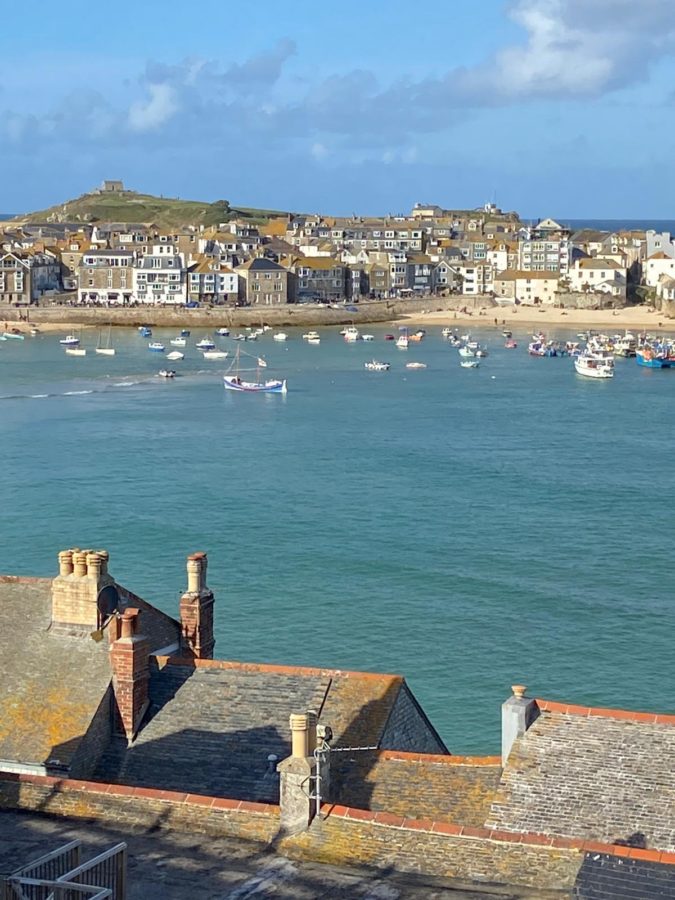
JOINING DETAILS:
- You can share details of this study using this link
- Please use the form below to secure your place with an initial registration deposit of £60.00. Once you have registered we will then send you details for payment of the balance owing (£500.00) to complete your booking by bank transfer.
- Facilitated by Toby Brothers and Sarah Snoxall
- Our meetings will take place in the fabulous Porthmeor Studios
- 28 September to 1 October 2025 (approximately 14 hours of study)
- Recommended editions: The Waves by Virginia Woolf, Vintage Classics, ISBN-13:
978-1784870843 or Penguin Classics, ISBN-13: 978-0241372081 - Cost £560, includes notes and critical resources (N.B. travel, food and accommodation are NOT included and participants are responsible for arranging their own travel, accommodation and insurance).
- Recommended places to stay include No 4 St Ives, 3 Porthminster Terrace, Blue Sky, The Olive Branch, Rivendell and the Harbour View Hotel, but PLEASE check web details and review sites before booking to make sure they will meet your needs.
Time
28 September 2025 5:00 pm - 1 October 2025 12:00 pm(GMT+01:00)
Location
St Ives, Cornwall
October 2025
Event Details
It has become a Salon tradition to spend some time each autumn on the Cornish coast reading Virginia Woolf’s work and enjoying one of
Event Details
It has become a Salon tradition to spend some time each autumn on the Cornish coast reading Virginia Woolf’s work and enjoying one of the places she loved and in which she spent significant parts of her childhood. In 2025 we are again offering two Woolf studies in St Ives: The Waves (28 September to 1 October) and The Voyage Out (3 to 6 October).
As one of the key members of the celebrated Bloomsbury Group, Woolf is seen primarily as a London writer, yet the Cornish coastal town of St Ives – where she spent many childhood summers – serves as a prism through which we can explore her perspectives on landscape, domesticity and identity.
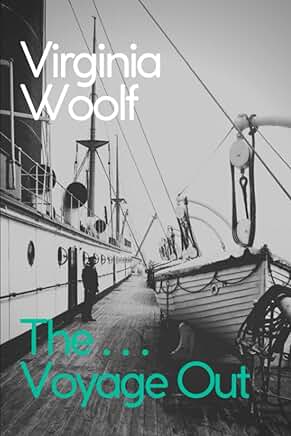
The Voyage Out is Virginia Woolf’s first novel. Athough not published until 1915, she may have begun writing it as early as 1906, when she was just 24. The book is mentioned in her letters from 1908, under the title Melymbrosia, but was set aside for some time following her breakdown in 1910, and then further delayed by another breakdown and attempted suicide after being delivered to her publisher in 1913.
Over these years, the book underwent numerous drafts and revisions, allowing the author to reflect many of her own experiences and preoccupations in its pages. Virginia married Leonard Woolf in August 1912 and, through her central character, Rachel Vinrace, she explores the tension between individual identity and the merging with others implicit in marriage, as well as suggesting possibilities beyond the binary that would feature in her later life and work.
According to E.M. Forster The Voyage Out is ‘. . . a book which attains unity as surely as Wuthering Heights, though by a different path’, he described it as ‘A strange, tragic, inspired novel . . . as poignant as anything in modern fiction.’ Toby, who is co-facilitating this study, admits that it was one of the first Woolf works she ever read and yet it is the last she has developed for a Salon study, in spite of the characters (who include Richard and Clarissa Dalloway appearing for the first time) and drama remaining with her for many years.
Reading The Voyage Out in the company of others is an opportunity to consider the early development of Virginia Woolf’s unique and innovative modernist style. This study will be rewarding for those who know her work well and readers dipping a toe into her literary stream for the first time.
We invite you to join us in St Ives, where we can explore a truly lovely place and share the work of a great author with a group of other keen minds.

During our visit you will have opportunities to visit the iconic Tate St Ives gallery overlooking the Atlantic Ocean, built between 1988 and 1993 on the site of an old gasworks, and the Barbara Hepworth Museum & Sculpture Garden. If weather allows, there will be an optional boat trip to Godrevy Lighthouse and we also hope to look at Talland House, Woolf’s childhood summer home (now privately owned). For several months of the year the elegant house overlooking St Ives Bay would be the Stephens’ family home until 1895 when Virginia’s mother, Julia Stephen, died. Although the complete family never returned to St Ives after their mother’s death, her children travelled back in 1905 following the death of their father in the previous year.
Feedback from participants in previous St Ives studies:
“The studio where the discussion took place is a beautiful, extraordinary place, the participants were imbued with the light and landscape, creating a friendly and committed atmosphere. The two facilitators were wonderful . . .”
“The collaboration between participants and facilitators was rich indeed, and I wonder how it was accomplished that everyone in the group was so insightful and intelligent and I might even say soul-searching . . . I also think it was just a superb group of people.”
Read Salonista Leah Jewett’s account of a Salon Study in St Ives here.

JOINING DETAILS:
- You can share details of this study using this link
- Please use the form below to secure your place with an initial registration deposit of £60.00. Once you have registered we will then send you details for payment of the balance owing (£500.00) to complete your booking by bank transfer.
- Facilitated by Toby Brothers and Sarah Snoxall
- Our meetings will take place in the fabulous Porthmeor Studios
- 3-6 October 2025 (approximately 14 hours of study)
- Recommended editions: The Voyage Out by Virginia Woolf, The 1915 Virginia Woolf Modern Fiction Classic (Annotated), Robinia Classics, ISBN-13 : 979-8365413207
- Cost £560, includes notes and critical resources (N.B. travel, food and accommodation are NOT included and participants are responsible for arranging their own travel, accommodation and insurance).
- Recommended places to stay include No 4 St Ives, 3 Porthminster Terrace, Blue Sky, The Olive Branch, Rivendell and the Harbour View Hotel, but PLEASE check web details and review sites before booking to make sure they will meet your needs.
Time
3 October 2025 5:00 pm - 6 October 2025 12:00 pm(GMT+01:00)
Location
St Ives, Cornwall
Event Details
Gustave Doré, Public domain, via Wikimedia Commons After Dante Alighieri’s death
Event Details
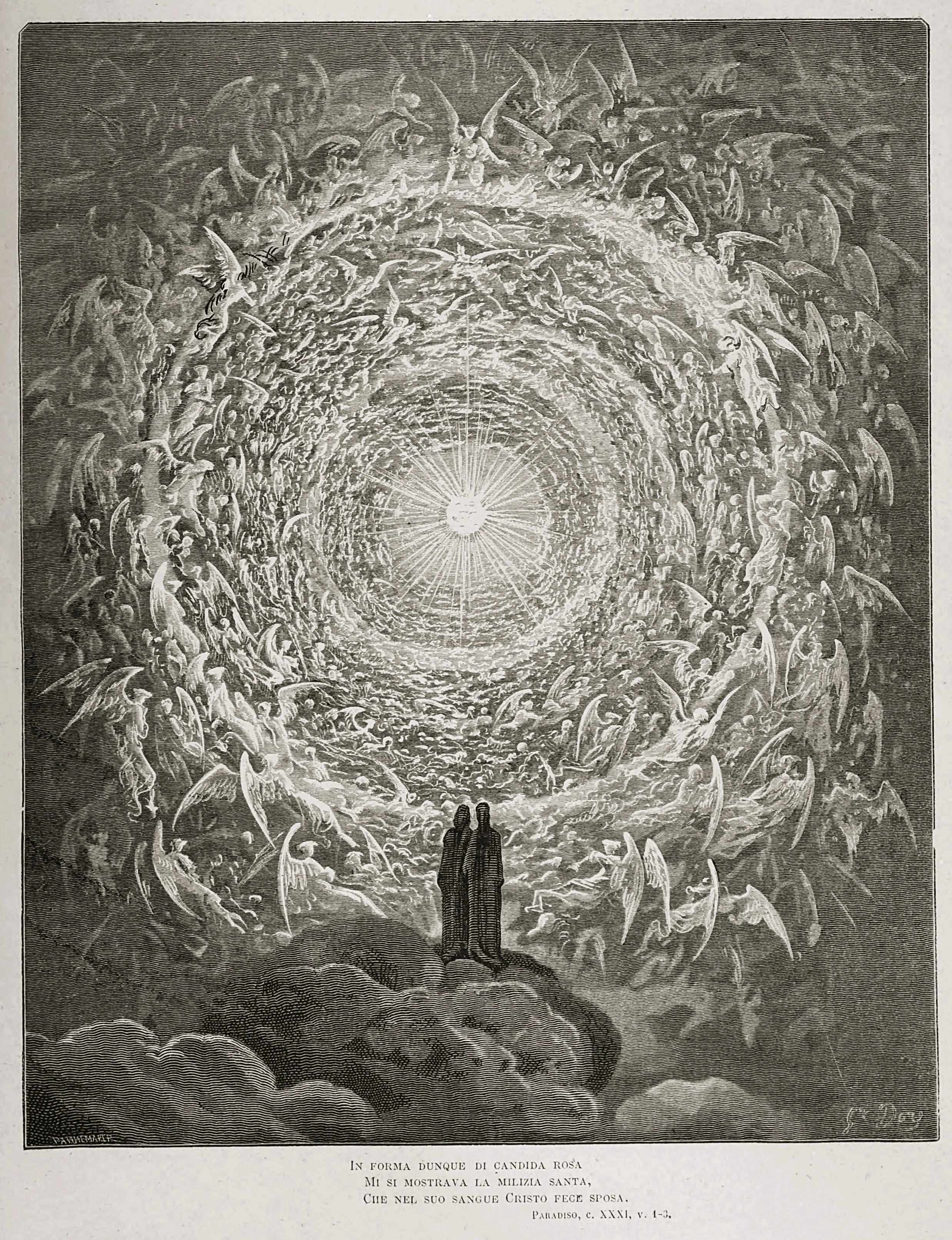
After Dante Alighieri’s death his family discovered that the final thirteen cantos of his Divine Comedy were missing. They searched for months and began to fear the great epic poem would never be published. But then, according to Boccaccio, Dante appeared to his son Jacopo in a dream. Clad in radiant white, the poet led his son to the house in Ravenna where he had lived in exile and pointed to a place on the wall. When Jacopo awoke, he went straight to the spot his father had shown him and found the missing cantos hidden behind the wall.
These final cantos describe Dante’s magnificent mystical vision of the afterlife awaiting virtuous souls. In the view of the translator and scholar Robert Hollander, “Dante’s Paradiso is surely one of the most daring poetic initiatives we have. . . . Theology set to music, as it were, it pushes its reader (not to mention its translators) to the limit.”
Our LitSalon group has read Inferno and Purgatorio, and we now move to Paradiso, but new readers are also welcome to join the journey. Why not begin with Dante’s heaven before descending into his hell? We hope to offer Inferno again in January 2026.
JOINING DETAILS:
- Eight meeting study of Paradiso, the third and final part of Dante’s Divine Comedy led by Sean Forester on Zoom
- Sundays, 4.00-6.00 pm (UK), 12, 19, 26 October & 2, 9, 16, 23, 30 November 2025
- You can use any translation of Dante that you prefer, although Sean recommends: Paradiso: A Verse Translation by Robert Hollander and Jean Hollander, ISBN-13 : 978-1400031153.
- £240 for eight two-hour meetings, to include background notes and additional resources.
- Use this link to share details of the study.
- The next cycle of The Divine Comedy will begin in January 2026 with Inferno (12 meetings) followed by Purgatorio in Spring 2026 (10 meetings).
Organizer
Time
12 October 2025 4:00 pm - 6:00 pm(GMT+01:00)
Location
VIRTUAL - ON ZOOM
Future Event Times in this Repeating Event Series
